The post Urge Canadian Lawmakers to Reject Proposed Amendments That Would Prevent Citizens From Providing Aid to Animals and Documenting Abuse appeared first on PETA.
This post was originally published on Animal Rights and Campaign News | PETA.
The post Urge Canadian Lawmakers to Reject Proposed Amendments That Would Prevent Citizens From Providing Aid to Animals and Documenting Abuse appeared first on PETA.
This post was originally published on Animal Rights and Campaign News | PETA.

The new innovation positions Climax Foods as the plant-based pioneer in successfully reproducing the utility, consistency, and flavor of the primary protein in animal milk for use in a range of applications, namely cheese. Climax’s plant-based casein is devoid of hormones, antibiotics, and the top eight food allergens. In addition, Climax Foods’ groundbreaking “precision formulation” technique enables the sustainable production of this protein at scale, price-wise equivalent to traditional animal-based casein.
Existing plant-based dairy alternatives are typically mixtures of oil and starch that can disappoint conventional cheese fans in terms of nutrition, texture, and performance. Climax says that despite more than $1.5B of funding invested into multiple companies aiming to manufacture a casein substitute through precision fermentation, significant scalability, and regulatory issues persist. Climax’s scientists, utilizing AI and plant-based ingredients, have discovered an alternative approach by identifying abundant and naturally occurring plant proteins capable of imparting genuine melt and stretch to plant-based cheeses.
“As foodies and scientists, we have a profound appreciation for the complex flavors and textures of dairy products, but also recognize their vast inefficiencies — such as requiring 700 gallons of water to make one pound of cheese,” Climax CEO and Founder Oliver Zahn, a Harvard-trained astrophysicist, and alum at both Google and SpaceX, said in a statement. “Our production process uses 500 times less water at our current pilot scale.”
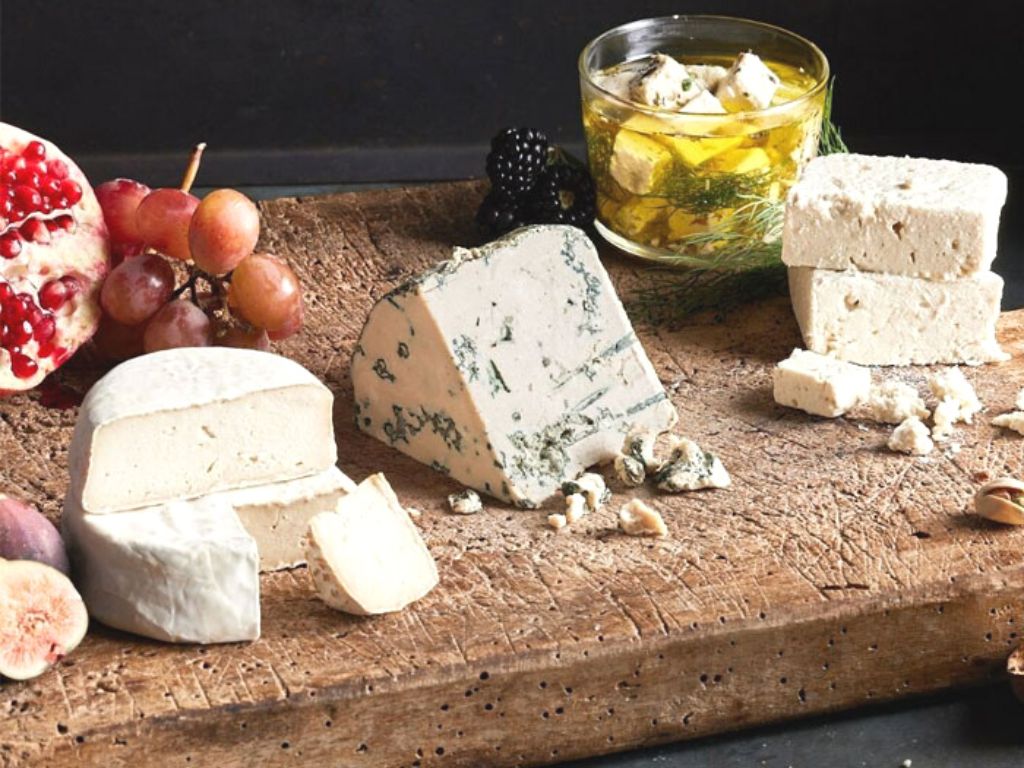
According to Daniel Westcott, Head of Protein and Texture at Climax Foods, the company can achieve this without the need for genetic modification as well — a major barrier to entry in key markets including the European Union.
“An immeasurable range of protein diversity and combinations already exists; we simply use data science and machine learning to pay very, very close attention,” Westcott said. “This gives us the ability to model and verify formulations at the microscopic level in a fraction of the time that it would take a traditional approach. And while we love learning through data science, we generate our data by making cheese, which means that the busiest half of our lab is the kitchen.”
Climax Foods’ “precision formulation” process combines data science with machine intelligence to uncover ideal ingredient and process combinations that maximize the potential of plant sources. Compared with the centuries-long trial and error methods traditionally used in food innovation, Climax Foods’ AI-enabled precision formulation process condenses this procedure into mere weeks.
New Culture, another Bay Area company working to replicate casein, just made its market debut at Nancy Silverton’s Pizzeria Mozza in Los Angeles. Unlike Climax, though, New Culture taps precision fermentation, a novel tech that uses microbes to recreate the dairy protein. While that cheese can serve as a stand-in for dedicated dairy lovers, it brings with it the allergen risks common with conventional dairy.
Zahn says Climax is able to offer “a better way to everyone, especially hardcore cheese lovers,” through its tech.
“To do this, we committed ourselves to understanding, on a microscopic level, what makes animal-based foods so craveable, and used that understanding to determine the precise steps needed to get that same exact performance from plant sources like seeds,” Zahn says.
“We’re not changing any ingredients genetically; we’re using what is already there. The difference comes from our depth of knowledge of the rich biodiversity of the plant kingdom down to a cellular level. Plants can impart all of the same texture, taste, and performance of animal-based ingredients – our AI-enabled Deep Plant Intelligence platform takes away the guesswork. For our casein replacement, our AI platform and precision formulation process helped us uncover a mechanism in specific plant proteins that imparts indistinguishable melt and stretch and mouthfeel from casein while also dramatically improving nutrition.”

Climax’s vegan casein-based cheeses have already earned the support of Michelin-starred chefs including Dominique Crenn and Jean Georges Vongerichten, as well as plant-based chefs Tal Ronnen, and Matthew Kenney. Major cheese manufacturers such as The Bel Group are also excited by the potential; Climax Foods has in aiding the redesign of Bel’s French staple cheese products into plant-based versions.
“Caseins are involved in all dairy transformations including cheese, yogurt, cream, and others,” said Anne Pitkowski, Bel Group’s Director of Research and Applications. “They are directly responsible for the product texture, stability, and, moreover, bring the very unique property of stretchability. Those properties are linked to the specific micellar structure of the casein assemblage that, until Climax Foods’ discovery, had not been met anywhere else in nature.”
While the company’s current focus is on dairy products, Zahn says that Climax Foods’ precision formulation process holds potential for the replacement of any type of animal-based food in the future.
“This is one of the most important scientific breakthroughs in food in the last six thousand years,” Zahn said, “but we are only getting started.”
The post Climax Foods Debuts ‘World’s First’ Plant Casein: ‘One of the Most Important Scientific Breakthroughs’ first appeared on Green Queen.
The post Climax Foods Debuts ‘World’s First’ Plant Casein: ‘One of the Most Important Scientific Breakthroughs’ appeared first on Green Queen.
This post was originally published on Green Queen.
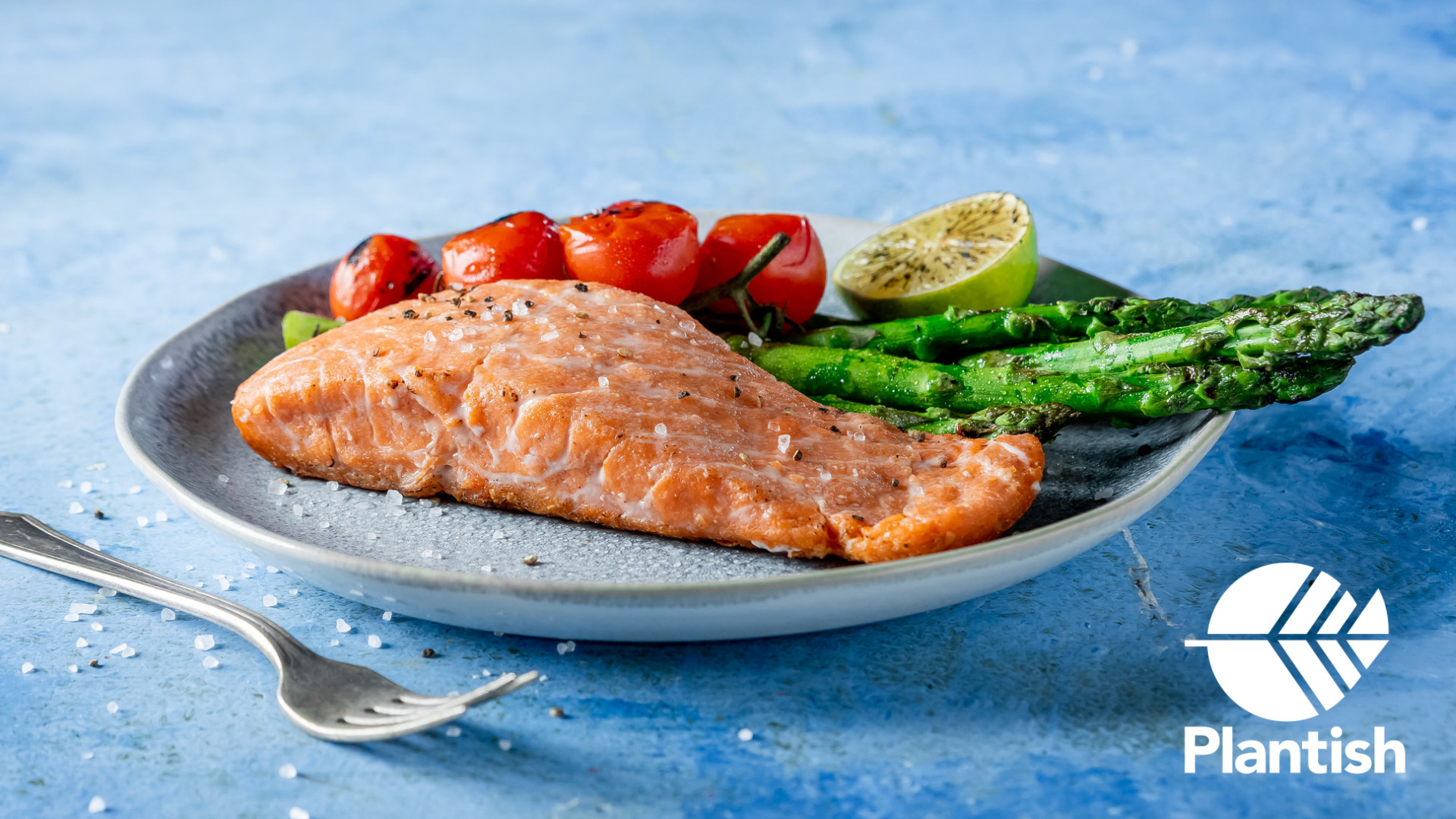
Oshi says the renaming event symbolizes a substantial evolution for the brand as it embraces its transition towards becoming a global food entity, readying itself for a U.S. product debut later this year.
To this point, Oshi has raised $14.5 million in funding. Among the notable investors are Unovis, renowned for its financial backing of industry players like Beyond Meat and Oatly. Additional backers includes Pitango, TechAviv Founder Partners, SOMV, SmartAgro, E2JDJ, Alumni Ventures, HackSummit, and OurCrowd.
The company, established in March 2021, boasts a roster of notable collaborators, encompassing Michelin-starred chefs, famed cookbook writer Adeena Sussman, and content producer Nuseir Yassin from Nas Daily.
“By rebranding to Oshi, we are embarking on a transformative journey to position ourselves as a leading global seafood company,” Ofek Ron, Co-Founder and CEO of Oshi, said in a statement. “Our new name, which stems from the word ‘Ocean,’ represents our values and our commitment to delivering exceptional seafood products that resonate with consumers worldwide. We are dedicated to offering a sustainable and delicious alternative to conventional seafood while promoting a healthier and more environmentally friendly food system.”
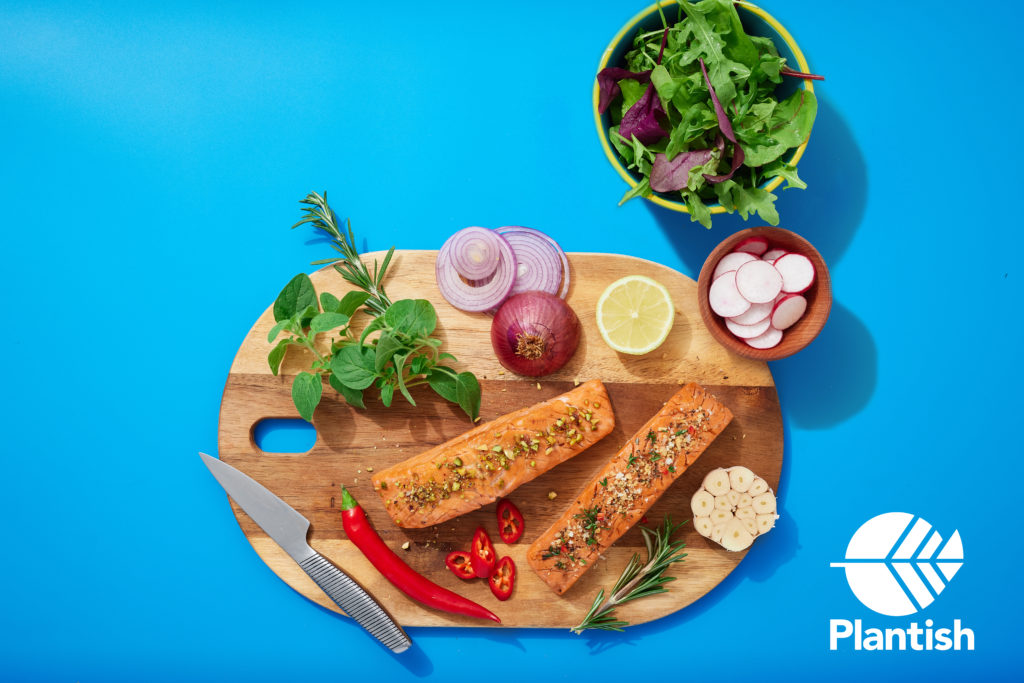
With the vast majority of global fish intake (more than 70 percent) being attributed to whole-cut styles like entire fish or fillets, Oshi has a strategic goal to instigate a sea-change in the alternative seafood domain through its introduction of whole-cut, plant-based salmon.
In the past, the technical hurdles of creating whole-cut alternatives resulted in a lack of options in the alternative seafood industry, which has predominantly been confined to products like fish fingers and fried fish. Oshi’s pioneering additive manufacturing technology has surmounted these limitations, laying the groundwork for a new, sustainable methodology in plant-based seafood creation.
Oshi is targeting a launch into the U.S. restaurant industry by the conclusion of this year, with ongoing chef collaborations to fine-tune product offerings ahead of the much-anticipated launch. Concurrently, the company has solidified a Memorandum of Understanding (MoU) with Coop for distribution collaboration on Oshi’s salmon fillets in 2025. Coop Group, one of Europe’s leading retail giants with more than 7,000 outlets, seeks to provide its customers with a sustainable, superior alternative to traditional salmon through this partnership.
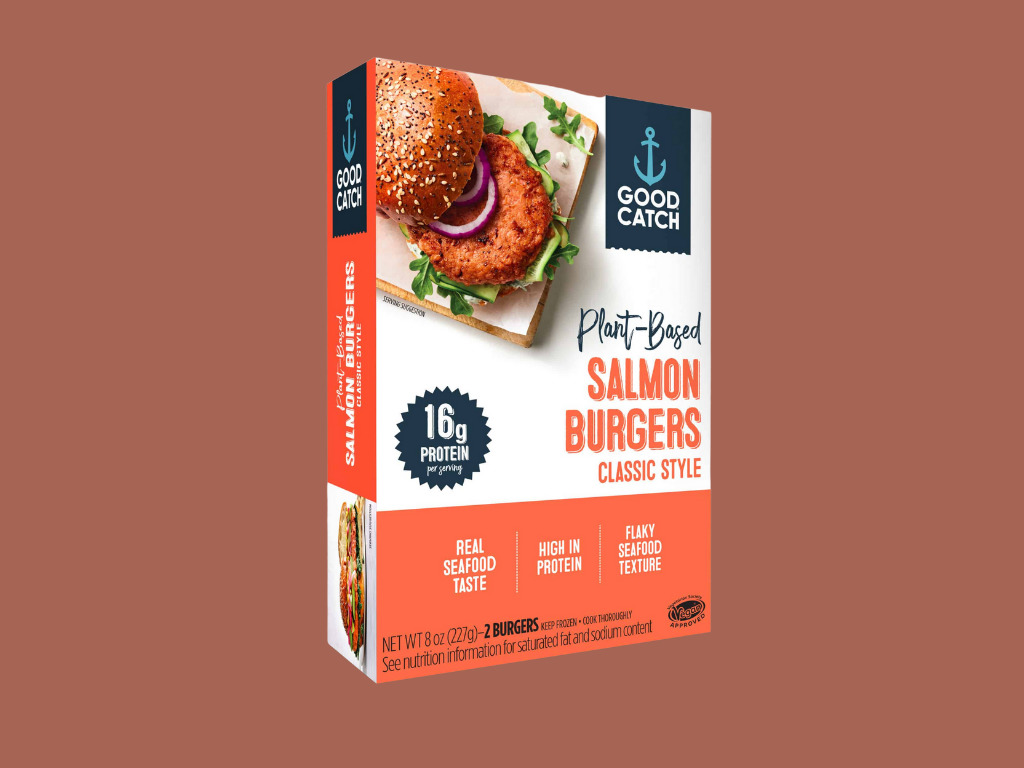
Oshi’s U.S. and European debuts will see it join an emergent seafood successors category led predominantly by the Wicked Kitchen empire that boasts the U.S.-based Good Catch and the recently acquired Current Foods.
Elsewhere, global seafood leader Thai Union has stepped up its vegan seafood offerings as well as led an investment into French algae startup Algama. And in Canada, Toronto’s New School Foods debuted its first product earlier this year: a plant-based whole-cut “raw” salmon filet that works and tastes just like conventional.
The post Vegan Seafood Startup Plantish Rebrands as Oshi As It Eyes Global Market first appeared on Green Queen.
The post Vegan Seafood Startup Plantish Rebrands as Oshi As It Eyes Global Market appeared first on Green Queen.
This post was originally published on Green Queen.
You can find some of the best vegan theme park options at Universal Orlando, from sweet crêpes and croissants to hearty pub food and dairy-free Butterbeer. It’s a good thing, too, since there’s so much to do and see that you’ll need a lot of fuel to keep you going all day. This guide covers some of the most exciting animal-friendly options you’ll want to try at these Universal Orlando parks: Universal Studios Florida and Universal’s Islands of Adventure.
Please note that theme parks make changes to menu offerings frequently and add new items all the time, so we highly recommend asking about the availability of vegan options at each establishment.
At the snack stand across from the TODAY Cafe, you can grab a warm Everything bagel–spiced pretzel, served with a spicy vegan curry aioli for dipping. Mmm!
This toasted sandwich features roasted portobello mushrooms, peppers, zucchini, and carrots with vegan jalapeño cheese and sun-dried tomato pesto on cranberry artisan bread.
Start your day off on the right foot with breakfast at the TODAY Cafe. The tasty Overnight Oats are made with old-fashioned oats, almond milk, chia seeds, and agave and topped with seasonal berries, toasted coconut, and toasted almonds.
This avocado toast is another breakfast option available at the TODAY Cafe, made with smashed avocado, toasted cashews, shaved fennel, roasted tomato purée, lemon vinaigrette, arugula, and radicchio on toasted French bread, served with a side of fresh fruit.
Don’t miss out on this sweet crêpe option, which features an egg-free batter topped with fresh blueberries, coconut whipped cream, vegan cream cheese, toasted almonds, and a raspberry sauce.
We love vegan pub food, and Finnegan’s delivers with a hearty Vegan Shepherd’s Pie, filled with seasoned Beyond Meat, mushrooms, peas, and carrots and topped with vegan mashed potatoes.
Mushroom burgers are a vegan staple, and this one from The Burger Digs is doing it right. It’s a balsamic-marinated roasted portobello mushroom with smoky tempeh bacon, vegan Swiss cheese, vegan secret sauce, crunchy lettuce, and sliced tomatoes on a toasted kaiser roll.
Looking for something hearty that’s also kind to animals? Three Broomsticks’ Mushroom Pie Platter is made with stewed jackfruit and mushrooms with a flaky crust, so no animals are killed for this savory option.
At Three Broomsticks and Leaky Cauldron, you can enjoy a vegan Butterbeer complete with a dairy-free topping, thanks to a push by PETA and a campaign by The Protego Foundation. It’s available iced or frozen for a refreshingly sweet treat.
Immerse yourself in The Wizarding World of Harry Potter at Leaky Cauldron, where you can enjoy the Shepherd’s Pasty Pie, made with beefless crumbles and vegetables, served with an apple beet salad and wedge fries. The Irish Stew here is also vegan, and choosing these options will help spare cows’ lives.
A rich and gooey chocolate brownie is the way to end your day of fun at Universal. This one is egg- and dairy-free, so no chickens or cows suffered because of it.
If you’re on Marvel Super Hero Island, try the Vegan Eggplant Parmesan, which is smothered in golden brown vegan cheese. The Spaghetti Bolognese, made with Gardein Italian sausage crumbles, is also vegan.
For a quick option, try the flaky, buttery Vegan Elderberry Croissant from the Croissant Moon Bakery. There’s also a regular vegan croissant option if you prefer something less sweet.
Pizza and tater tots are a match made in heaven, so it makes sense that the Vegan Pizza Tots at Green Eggs and Ham Cafe are a hit. These crispy tots come with marinara sauce, dairy-free cheese, vegan sausage, and Worthington’s meat-free pepperoni slices. You can also find similar Vegan Pizza Fries at KidZone Pizza Company.
This guide isn’t comprehensive, and you’ll be able to find delicious vegan options at many of the other eateries in the parks. Universal’s surrounding resorts also have many options to choose from, and you can even try some great things without a park ticket at Universal CityWalk. And check out our Universal Studios Hollywood guide if you’re visiting the California park.
Simply by choosing vegan options, you can help spare the lives of many cows, pigs, chickens, fish, and other animals who are used for food. Learn more about how to go vegan by ordering a vegan starter kit today:
The post Butterbeer, Crêpes, and Croissants—Here’s What’s Vegan at Universal Orlando appeared first on PETA.
This post was originally published on Animal Rights and Campaign News | PETA.
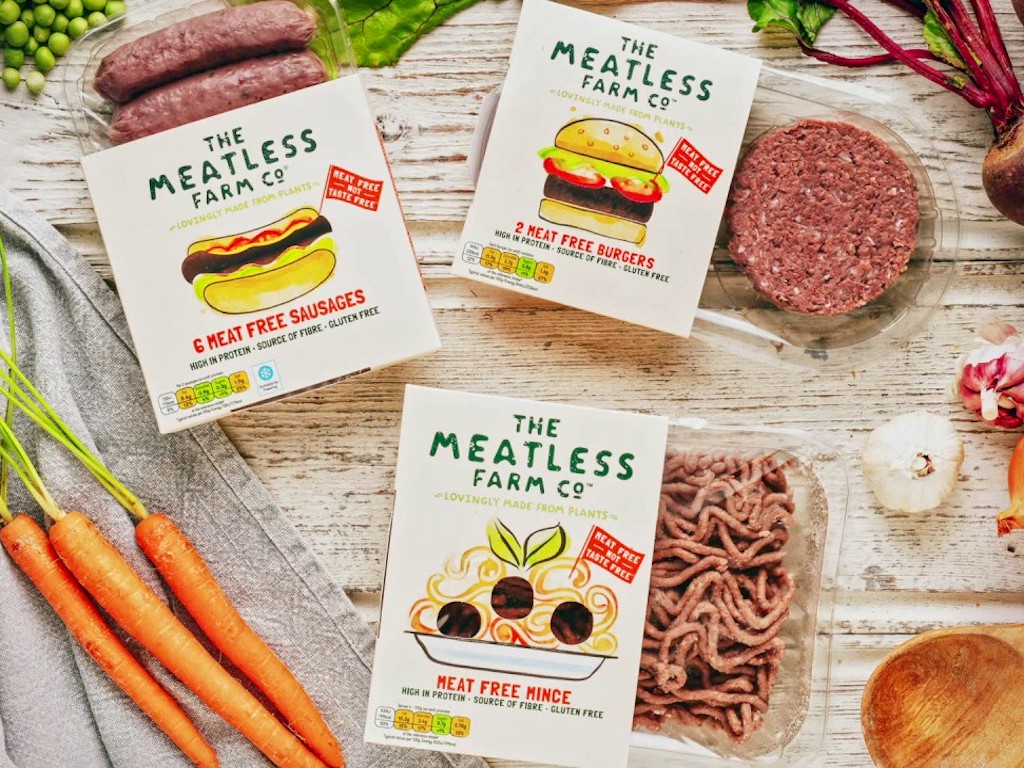
As first reported by The Grocer today, a notice of intention to appoint administrators was filed last Friday and all employees at the company’s Leeds headquarters were made redundant.
As recently as two weeks ago, the company warned shareholders it was facing millions in losses and needed to find a buyer to stave off administration. The company has raised over £40 million in funding to date, with the latest round closed in 2021 via crowdfunding.
While the company has not made an official announcement, the Meatless Farm website is no longer operational and the brand’s products can no longer be found in supermarkets and other former retail partners. The company’s last Instagram post was from over a week ago and the last LinkedIn post dates from almost two weeks prior.
Just over a month ago, the company announced the launch of four new products, which it described as “the UK’s first branded plant-based meat-filled pasta” and debuted “the UK’s first Automated Plant Machine (APM)”, a vending machine dispensing free plant-based foods, as part of the Veganuary 2023 campaign in January.
The company’s commercial director Tim Offer announced he was looking for a new role over the weekend in a social media post, writing: “Sadly my time at Meatless Farm has come to an end. After a fantastic 10 months leading a talented and highly engaged sales team the business has unfortunately made all the teams redundant. I learnt a huge amount in a short space of time and have absolutely loved the people and the brand. I am now actively looking for new opportunities as #SalesDirector, #commercialdirector , #headofsales in #FMCG.”
Meatless Farm’s plant-based range, made primarily from pea protein (like its US counterpart Beyond Meat) and rice protein, included mince, burger patties, Chipolata sausages, steaks, chicken breasts, meatballs and a range of ready meals. The brand’s products could be found at various UK supermarkets including Sainsbury’s, Morrisons and the Co-op. In the US, the company inked a distribution deal with over 600 Whole Foods stores.
In addition, the company had a dedicated foodservice offering for restaurant partners and famously secured a nationwide placement on the menus of UK pub chain Wetherspoons’ 900 locations in 2019.
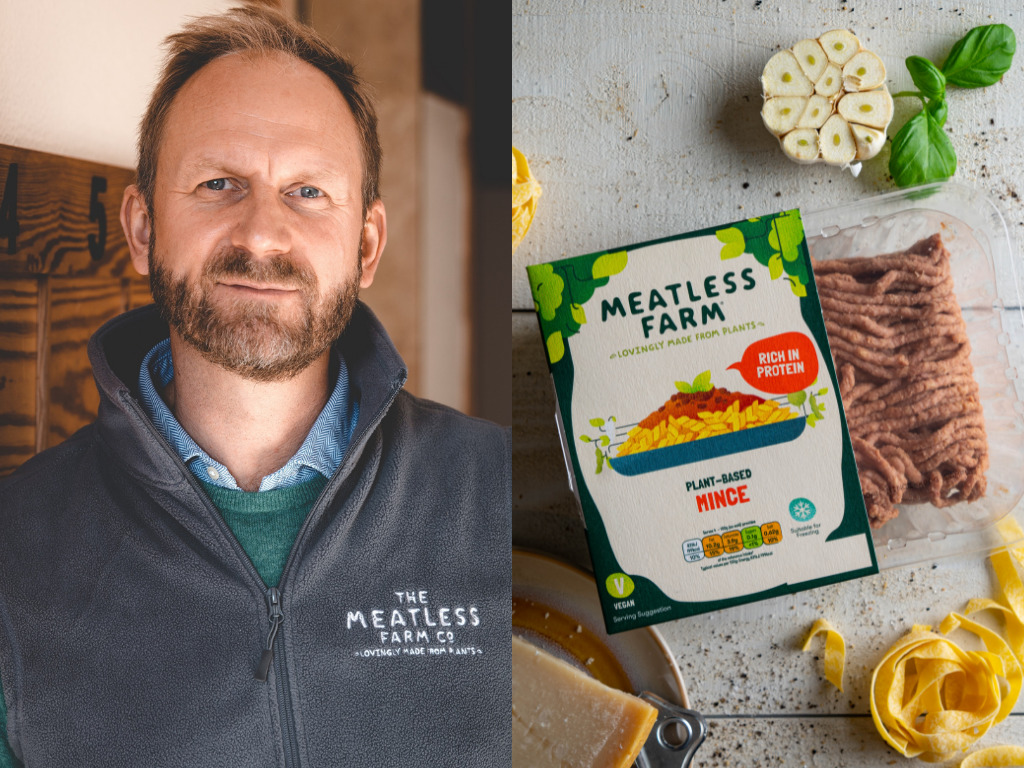
In a March 2023 interview with Business Leader, Toft Bech said that Meatless Farms’ 2022 sales were up 30% year on year and the company was hoping to close a £35 million funding round. When asked whether the vegan bubble was going to burst, he replied: “t is clear that the plant-based movement is here to stay. Over the last year Meatless farm has seen double-digit growth thanks to greater innovation and consumer demand despite the ongoing challenges posed by both the cost-of-living crisis and the coronavirus pandemic.”
Andy Shovel, co-CEO and co-founder at fellow British vegan meat brand THIS commented on the news in a statement via email: “It goes without saying that our thoughts as a team, go out to everyone who works at – or with, Meatless Farm. It must be a massively stressful time. It’s also a symptom of a category which is consolidating and reacting to consumers’ need for brands which really signpost quality, and very little departure experientially, from eating animal-based food. This rationalisation is very typical of high-growth and emerging categories, for instance craft beer and smoothies saw a similar process.”
This is a developing story.
The post UK’s Meatless Farm Makes Team Redundant As It Prepares For Bankruptcy first appeared on Green Queen.
The post UK’s Meatless Farm Makes Team Redundant As It Prepares For Bankruptcy appeared first on Green Queen.
This post was originally published on Green Queen.
PETA Kids Spotlight: ‘I Believe in Animal Rights—Here’s Why You Should, Too!’
What One Kid Wants You to Know About Animal Rights
What One 12-Year-Old Wants Kids to Know About Going Vegan
12-Year-Old Shares Why Going Vegan Is the Best Choice You Can Make
One 12-Year-Old Shares Why You’re Never Too Young to Make a Difference
Why Should Kids Care About Animal Rights? One 12-Year-Old Has the Answer
Dani, a 12-year-old, shares why going vegan is the best decision anyone can make. She’s got tips to help other kids get started today.
Dani’s been vegan since she was 5. Find out what she’s learned and read her tips for other kids interested in saving animals.
The post One 12-Year-Old Shares Why You’re Never Too Young to Make a Difference appeared first on PETA.
This post was originally published on Animal Rights and Campaign News | PETA.

Meati Foods isn’t short on capital; the company has raised more than $250 million following its recent Series C funding round. But Jeter’s commitment to Meati Foods stretches beyond mere financial involvement; the high-profile investor has also pledged his services as an advisor to the company.
Jeter, who was guided by three essential factors when exploring investments in this field — nutrition, sustainability, and taste — found Meati Foods to be a match. “Meati certainly delivers, with great quality steaks and cutlets and an institutional emphasis on high nutritional value and sustainable practices. As we look to the future, the choices we make and the impact we leave are critical, and I appreciate the way Meati has dedicated efforts to making a real difference,” Jeter said in a statement.
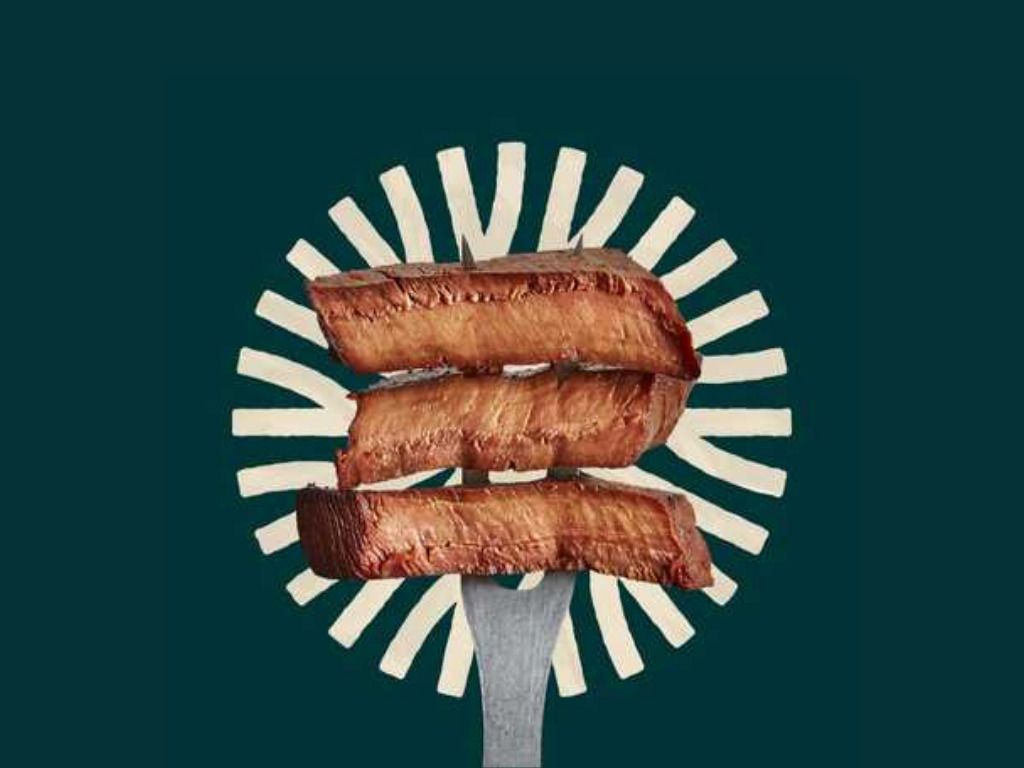
President and COO of Meati Foods, Scott Tassani, views Jeter’s involvement as a noteworthy testament to the company’s product. “Derek has seen endless products cross his desk for partnership consideration, and we’re honored by his support and inspired by his passion for a more sustainable, equitable, nutritious food ecosystem,” Tassani said.
Jeter’s investment in Meati expands on his portfolio, which already includes Performance Kitchen, Amass, and Bespoken Spirits. A philanthropist at heart, he established the Turn 2 Foundation in 1996, which promotes healthy lifestyles among the youth and has since given out over $34 million in grants.
Established in 2017, Meati Foods has set out to transform the food system into a more delightful, nutritious, fair, and sustainable model. The debut line, Eat Meati, includes mushroom root-derived cutlets and steaks. After an overwhelmingly successful launch through its online shop, the company is planning a nationwide omnichannel rollout late this year.
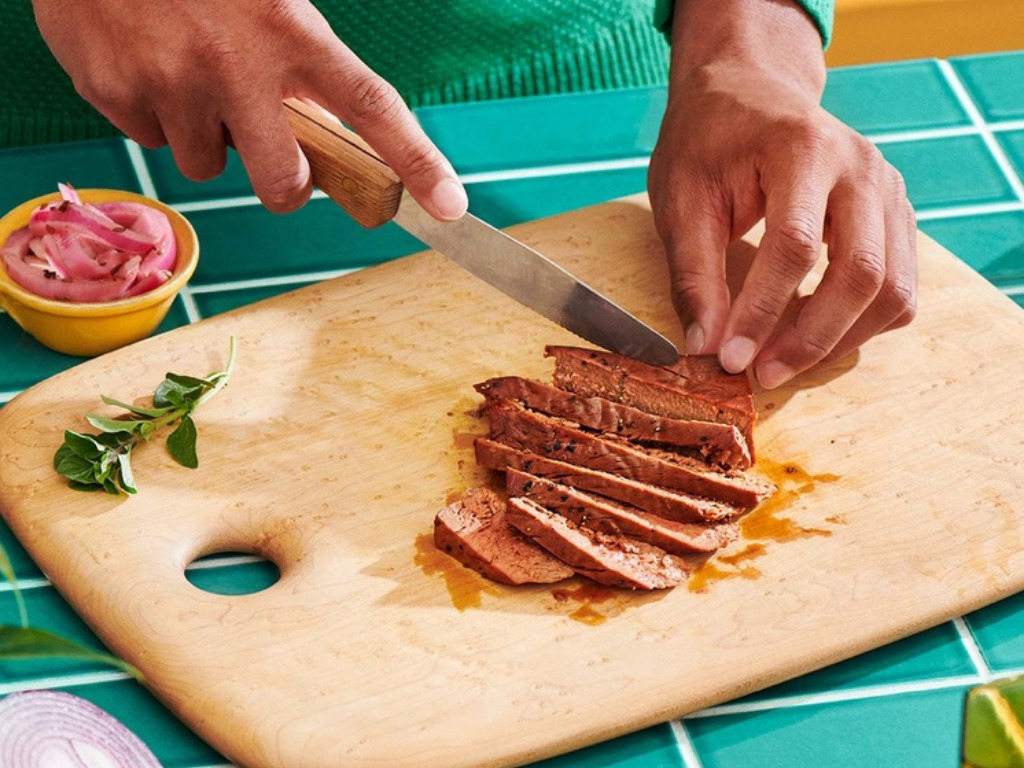
The company has enjoyed a significant amount of media attention for its mushroom-based clean meat. Its earned support from several culinary figures including television host and philanthropist, Rachael Ray; David Chang, the brain behind Momofuku and Majordomo Media; Sweetgreen co-founders Nicolas Jammet and Jonathan Neman, and ex-senior policy advisor for nutrition at the White House, Sam Kass.
The partnership with Jeter builds on the brand’s recent rollout across Sprouts stores throughout the U.S. in March. In January, the company announced its “mega ranch” in Colorado, which it says can rival the output of conventional animal farms.
The post Meati Foods Scores a Home Run With MLB Hall of Famer Derek Jeter Investment first appeared on Green Queen.
The post Meati Foods Scores a Home Run With MLB Hall of Famer Derek Jeter Investment appeared first on Green Queen.
This post was originally published on Green Queen.
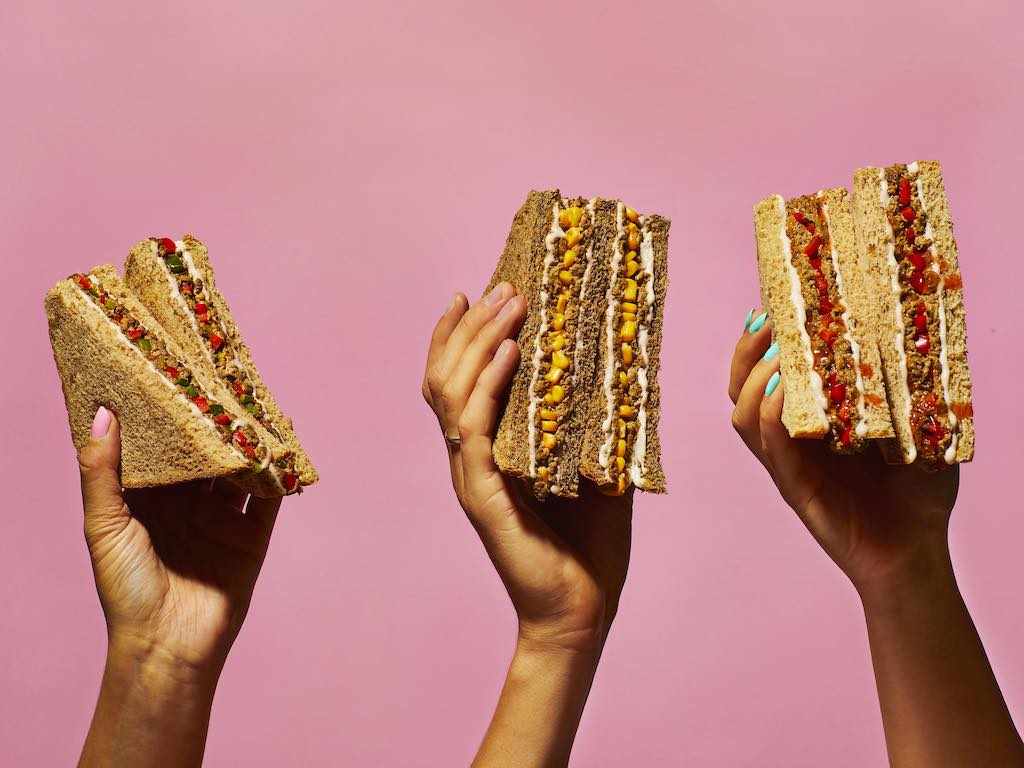
According to BettaFish, its vegan seafood alternatives have prevented 122 tons of tuna and 124 tons of bycatch from being consumed since its launch in 2021. Yet, the company says it’s far from done, as the Berlin-based startup set to launch its newest product, the Tu-Nah can, soon available via an exclusive waiting list.
World Ocean Day holds special significance for BettaFish, a company dedicated to preserving the world’s oceans. “Seventy percent of the Earth is covered by water, yet we mainly rely on the remaining 30% to feed our population,” Co-Founder Deniz Ficicioglu said in a statement. BettaFish has aligned itself with The Ocean Project’s #Protect30x30 campaign, aiming to safeguard 30 percent of the world’s land and waters by 2030, leveraging seaweed’s ecological benefits in the process.

Seaweed, a “good impact food”, flourishes without requiring soil, freshwater, fertilizers, or pesticides, simultaneously restoring equilibrium to fragile marine ecosystems. It also presents a sustainable alternative to fishing that upholds the economic stability of fishing communities without necessitating relocation inland. The promise of transitioning from fishing to seaweed cultivation has been realized in collaborative efforts with partners like Seaweed Solutions.
Deniz and his co-founder Jacob von Manteuffel, in collaboration with food technologists and chefs, have crafted Tu-Nah, an authentic tuna substitute that is entirely plant-based, packed with protein, and free of soy and wheat. This innovation targets the $42 billion tuna market, where 43 percent of the global tuna stocks are fished at biologically unsustainable levels, according to FAO.
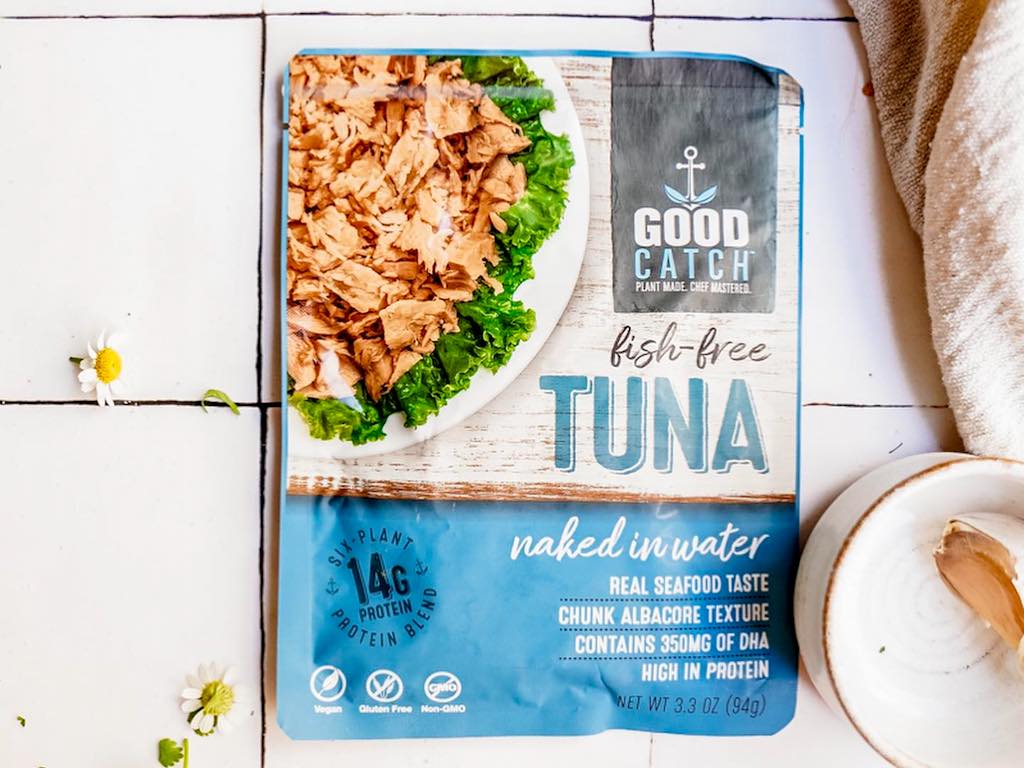
The impact of BettaFish’s seaweed-based foods has resonated across Europe, reaching Germany, Austria, Switzerland, the Netherlands, France, Spain, Greece, and the U.K. Since its Tu-Nah Sandwiches launched in October 2021, BettaFish has served 62.2 tons of Tu-Nah, which it says spared 122 tons of conventional tuna from being removed from oceans and avoiding 124 tons of bycatch. Moreover, through seaweed cultivation with local farms in Norway and Ireland, BettaFish has absorbed 1.32 tons of CO2 and conserved 1.25 million liters of freshwater.
Plant-based seafood is on the rise with a number of companies entering the market in recent years. Last month, Wicked Kitchen, which owns the vegan tuna leader Good Catch, announced the acquisition of Current Foods — a startup specializing in plant-based seafood for fine dining establishments and food service operations across the U.S. and Europe.
The post BettaFish Launches Vegan Canned Tuna As It Hits a Conservation Milestone first appeared on Green Queen.
The post BettaFish Launches Vegan Canned Tuna As It Hits a Conservation Milestone appeared first on Green Queen.
This post was originally published on Green Queen.
Although June is National Dairy Month, a new message from PETA atop Waldo Pizza may have diners opting for a vegan slice. Featuring a cow mired in manure with a swollen udder, PETA’s new sky-high appeal urges everyone to help spare cows suffering by ditching dairy—something that’s easy to do at Waldo Pizza and many other restaurants in the City of Fountains.
“If diners saw cows confined in filth and forcibly impregnated on dairy farms, they’d lose their taste for cheese pizza in a heartbeat,” says PETA Executive Vice President Tracy Reiman. “PETA urges everyone to ditch dairy and leave cows in peace by opting for delicious vegan cheeses, milks, and yogurts.”
In the dairy industry, calves are torn away from their mothers within a day of birth so the milk meant to nourish them can be stolen and sold to humans. It’s standard industry practice to forcibly and artificially inseminate cows—workers insert an arm into the animals’ rectum and a metal rod to deliver semen into their vagina—and to send them to slaughter once their bodies wear out. PETA’s investigations into dairy facilities have found workers electroshocking cows in the face, hitting them with poles and a cane, and abusing them in other ways.
PETA’s billboard is located at 7433 Broadway St.
PETA—whose motto reads, in part, that “animals are not ours to eat”—opposes speciesism, a human-supremacist worldview, and offers a free vegan starter kit on its website. For more information, please visit PETA.org, listen to The PETA Podcast, or follow the group on Twitter, Facebook, or Instagram.
The post Mamma Mia! PETA’s New Vegan Plea Lands Above Local Pizzeria appeared first on PETA.
This post was originally published on Animal Rights and Campaign News | PETA.
The post Ye Can Live Without Yon Turkey Leg. I Cannot. Go Vegan Forthwith! appeared first on PETA.
This post was originally published on Animal Rights and Campaign News | PETA.

The original Game Changers film, directed by Louis Psihoyos, and featured executive producers James Cameron, Arnold Schwarzenegger, Jackie Chan, Lewis Hamilton, Chris Paul, and Novak Djokovic, showcased the remarkable rise of plant-based eating in professional sports. Some of the world’s top athletes, including Olympians featured in the film, have adhered to a plant-based diet.
The film explored the physiological advantages of a plant-based diet, looking at performance and bloodwork, among other determining factors in overall health. With heavyweights like Schwarzenegger and Hamilton featured in the film, it was an instant hit.
The film has been viewed more than 100 million times and the documentary is widely credited with sparking a significant shift in global eating habits.
The sequel will be co-directed by Stephanie Soechtig and Kristin Lazure, known for their work on acclaimed films such as Fed Up, Knock Down the House, The Devil We Know, and the upcoming Poisoned on Netflix. Produced in collaboration with their production company Atlas Films, the feature documentary is set to begin production in the coming summer. The executive producers for Uninterrupted include LeBron James, Maverick Carter, Jamal Henderson, and Philip Byron, with Matt Rissmiller and Naomi Wright serving as co-executive producers.
Commenting on the collaboration, James Wilks, producer and star of The Game Changers, expressed his excitement, stating, “With The SpringHill Company’s proven ability to merge athlete-driven storytelling with progressive subject matter, and Stephanie and Kristin’s talent for blending engaging personal narratives with impactful investigative journalism, we couldn’t be more thrilled about this team.”
The sequel will delve into the profound impact of food choices not only on personal performance and health but also on broader issues such as children’s health, food justice, and the environment. Several of the original executive producers are expected to return for this second installment, which will feature an impressive lineup of athletes and entertainers. Together, they will tackle challenging food-related topics and present compelling stories from various continents.

Soechtig and Lazure, the co-directors, expressed their enthusiasm for joining the team, saying, “The Game Changers had a profound impact on us as individuals and filmmakers. We know there’s much more to explore, and we are thrilled to be a part of this project.”
Philip Byron, Head of Unscripted & Docs at The SpringHill Company, emphasized the unique opportunity to expand on the cultural conversation ignited by The Game Changers, addressing the critical role food plays in tackling pressing issues of our time.
“The SpringHill Company has evolved into a full-service production company, and we are thrilled that James Wilks and Joseph Pace selected us to help craft their highly anticipated sequel and equally excited to work with Stephanie and Kristin on the first of hopefully many projects,” Byron said.
The post LeBron James’ Uninterrupted Backs ‘Game Changers’ Sequel: ‘We Couldn’t Be More Thrilled’ first appeared on Green Queen.
The post LeBron James’ Uninterrupted Backs ‘Game Changers’ Sequel: ‘We Couldn’t Be More Thrilled’ appeared first on Green Queen.
This post was originally published on Green Queen.

The expansion marks the company’s first foray into the international market. Shaka Harry is set to introduce 15 innovative products at Mustafa Centre Singapore, a four-level retail hub and iconic shopping mall known for its 24-hour market-style shopping experience.
To support the launch in Singapore, Shaka Harry has planned a range of marketing and promotional activities. These include in-store demonstrations, engaging social media campaigns, and collaborations with local food bloggers and influencers. The company also aims to establish partnerships with local restaurants and food service providers to incorporate their products into their menus.
“Expanding our business to Singapore, a country globally recognized for its commitment to promoting plant-based diets and addressing public health, environmental, and ethical issues, holds significant importance for Shaka Harry,” Anand Nagarajan, co-founder of Shaka Harry, said in a statement.
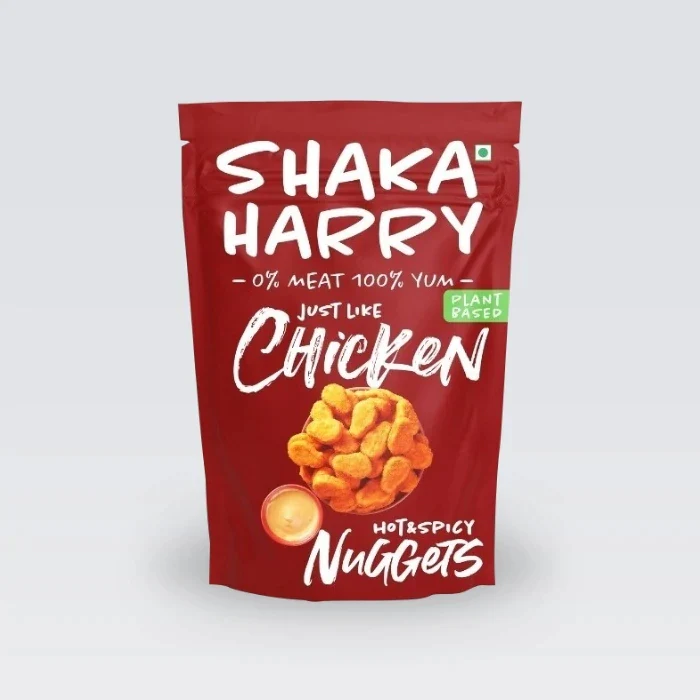
“We are delighted to bring our products to discerning consumers in a country that shares our dedication to promoting plant-based diets and creating a more sustainable and compassionate food system. We are confident that our products will appeal to the growing number of individuals embracing flexitarian diets and seeking healthy, delicious, and environmentally friendly food options,” Nagarajan said.
“Mustafa Shopping Centre Singapore is proud to announce the launch of Shaka Harry, a plant protein company backed by the legendary cricketer MS Dhoni,” said Mohd Saleem of Mohamed Mustafa & Samsuddin. “Shaka Harry’s innovative approach to sustainable and ethical protein production is a timely and important solution to address the challenges faced by our planet. We are excited to offer our customers access to Shaka Harry’s delicious and nutritious plant-based products, and we believe that this partnership will help create a brighter and more sustainable future for all.”
Sandeep Devgan, Shaka Harry co-founder says the timing couldn’t be more exciting for the brand. “Collaborating with Mustafa Centre will give us the impetus to propel the Shaka Harry brand in the global marketplace,” Devgan said. “Already established as the best-performing brand in online stores where we have a presence, we are now poised to launch our exclusive range of 15 products in Singapore alongside Mustafa. Food is a pivotal area where sustainability can make significant strides, and Singapore is at the forefront of adopting cultivated meat and plant-based diets worldwide.”
According to Devgan, India’s government, along with APEDA (the Agricultural and Processed Food Products Export Development Authority), is actively promoting the export of plant-based food. “We are excited to be part of this growth story and build momentum,” he said. “India’s plant-based food products are highly regarded overseas due to their ethical values and contributions from foodservice operators and retailers. Building a consumer segment in the food industry necessitates a well-designed product range, deep expertise in taste and flavor, and a consistent customer experience. Our dedicated team at Shaka Harry is committed to creating the best plant-based food products in terms of taste and quality.”
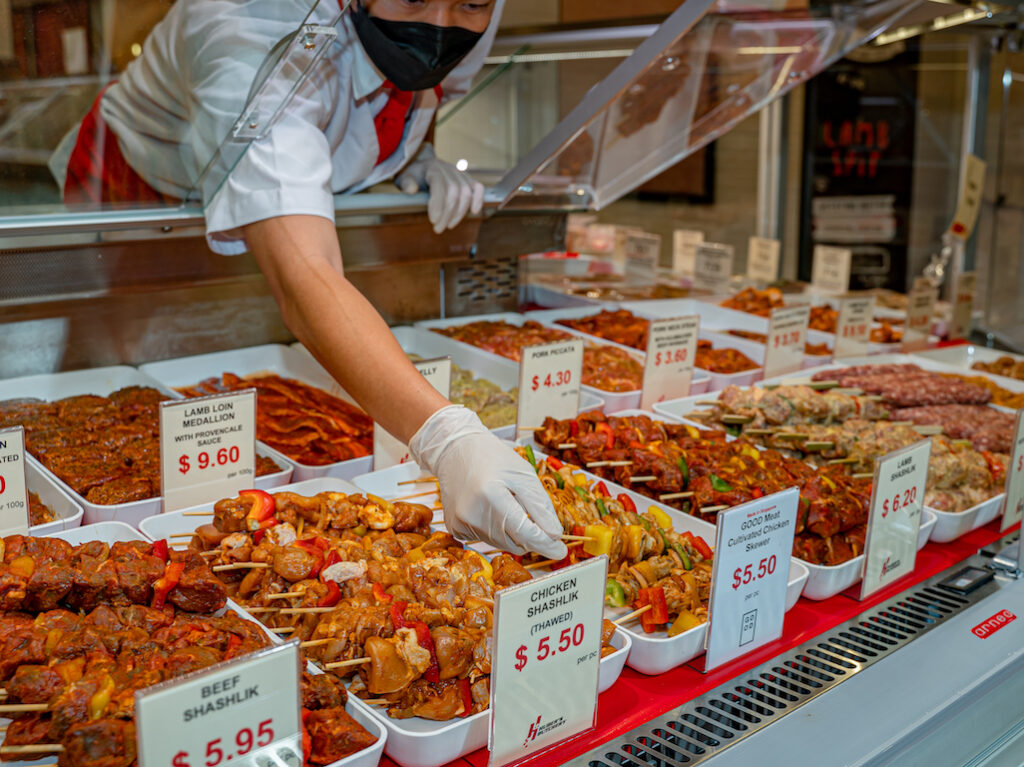
Both India and Singapore have emerged as global hotspots for the alternative protein industry, attracting startups and innovations. While much of India’s development is happening with regional brands, Singapore has become a hub for international brands across a range of categories including cultivated meat, where Singapore is currently the only country to approve it for sale and consumption.
A recent survey on Singaporean dietary habits revealed that consumers are excited about the options; 46 percent of respondents expressed a willingness to adopt a plant-based diet due to health concerns, while 39 percent follow a flexitarian diet. The plant-based trend in Singapore has experienced an impressive average compounded growth rate of over 12 percent in the past four years, driven by health consciousness, taste preferences, and dietary restrictions related to religion or ethics. Notably, this trend has garnered an overwhelming 94 percent positive sentiment among consumers in Singapore.
The post India’s Shaka Harry Makes Its International Debut In With 15 Plant-Based Products In Singapore first appeared on Green Queen.
The post India’s Shaka Harry Makes Its International Debut In With 15 Plant-Based Products In Singapore appeared first on Green Queen.
This post was originally published on Green Queen.
The post Courtney Stodden: We Want You To Switch To Veggie Dogs! appeared first on PETA.
This post was originally published on Animal Rights and Campaign News | PETA.
An ear to King Felipe VI of Spain … my lungs to the governor of Alaska … a piece of my heart to Elon Musk: Talk about putting your whole self into some final wishes!
Not many people—even passionate presidents of driven nonprofits—write wills with instructions on how to dole out their body parts to benefit an organization’s mission. And only one has done precisely that and lived another 20 years—long enough to update her will with increasingly clever requests. Who’s doing all this to advocate for animal rights? Ingrid Newkirk, founder and president of PETA.
On the 20th anniversary of the writing of Ingrid Newkirk’s original will, she’s revised it to help even more animals in even more highly creative ways. PETA has also won so many victories for animals since the original will’s release that she was dead set on exhuming and reviving it. Now, for example, instead of receiving an accusing finger for forcing elephants and other animals to perform, Ringling Bros. and Barnum & Bailey Circus will get a thumb—as a thumbs-up for leaving animal acts in the past.
The will ensures that even after her demise, Newkirk will continue to help animals and honors her commitment that “my body be used in a manner that draws attention to needless animal suffering and exploitation.”
Although grisly at first glance, Newkirk’s bodily bequests will inspire animal advocates while also encouraging everyone still slumbering in speciesism to wake up:
As cows, pigs, chickens, and other animals continue to be treated badly, and killed for meat, eggs, and bovine mammary secretions, the thought of carving up human flesh for steaks might be just the thing to jolt diners into kindness. “Flesh is flesh, and mine is given, not taken,” says Newkirk.
This powerful postmortem act will remind the world that the skin of humans is the same as that of other animals, who don’t give it up willingly. Leather is a key part of animal agriculture, which alone is responsible for approximately one-fifth of all human-induced greenhouse gas emissions. Raising and killing cows for their flesh and skins requires huge amounts of feed, land, water, and fossil fuels. The only truly eco-friendly leather is vegan leather, which is made from an array of innovative, durable, and sustainable materials, including pineapple leaves, cork, and apple peels.
One of these items is to be delivered to Hermès, which supports massive suffering and killing animals in the name of fashion. PETA entities have repeatedly exposed the violent ways workers kill animals in Hermès’ supply chain. Alligators are packed on top of each other in dank pools and crocodiles are crowded in barren concrete pits for months or even years before they’re finally slaughtered for their skin. PETA’s investigator documented that workers crudely hacked into the necks of alligators and that one worker tried to scramble their brains with a metal rod. It’s crucial for consumers to buy only animal-friendly vegan clothing and to avoid Hermès until it stops selling exotic skins. Many brands and companies, including Macy’s, have ditched exotic-animal skins, but others, like Hermès, continue to obtain them by funding horrific cruelty to snakes, ostriches, lizards, crocodiles, and alligators. The lizard tattoo on Newkirk’s arm will become a real—but 100% cruelty-free—“lizard skin” purse.
The other item goes to the prime minister of India to remind that nation’s government to spare Indian bullocks, who—after a life of extreme and involuntary servitude, as Newkirk has seen firsthand—are slaughtered and their skin exported all over the world to be made into accessories, furniture coverings, and automobile seats. Leather production causes massive animal suffering. Cows killed for their skin are routinely subjected to mutilations, including castration, their horns being burned off or gouged out, and hot-iron branding—all without painkillers. In many cases, cows are dismembered and skinned while they’re still conscious.
Newkirk hopes her broken leg will help end this abusive cycle. It’s common practice to administer drugs to horses who are forced to race in order to mask an injury or strain, rather than allowing the animals to rest and recover, which can lead to broken bones and death.
The Kentucky Derby, first held in 1875 at Churchill Downs racetrack in Louisville, is the longest continuously running sports event in the U.S. Twelve horses have died at the track since the week before this year’s Kentucky Derby on May 6. An average of three horses die every day on tracks in the U.S. When horses forced to race stop winning, they’re sometimes sold at auction and sent to slaughter.
As a result of the Randox Grand National Festival this year, Envoye Special, Dark Raven, Hill Sixteen, and Hullnback are dead. The death toll continues to rise each year, claiming more lives. Since 2010, 36 horses have died at the festival, which is held annually at Aintree Racecourse, near Liverpool, England, and is one of the most-watched races in the world. The three-day festival concludes with the Grand National race, which is—by design—an accident waiting to happen, as 40 horses compete for space on the 4.5-mile course fraught with obstacles, jumps, and dangerous terrain.
One of Newkirk’s eyes will be watching until the federally funded NIH stops financing and conducting billions of dollars’ worth of painful experiments on animals every year and channels that taxpayer money into state-of-the-art, superior, non-animal methods. NIH imprisons hundreds of thousands of animals in its own government laboratories and funds animal laboratories all over the world.
Nearly half of NIH’s budget—about $19 billion annually—is used to fund experiments in which animals are burned; electroshocked; deprived of food, water, or sleep; intentionally infected with diseases; addicted to drugs like cocaine and heroin; poisoned with industrial chemicals; and driven insane from their isolation in small, barren cages. More than 90% of these tests provide no useful data for developing new treatments for human patients, but they inflict an enormous amount of terror, agonizing pain, and suffering on millions of animals locked in laboratory cages and awaiting the next cruel procedure before they’re ultimately killed.
Her other eye will remain on the U.K. Home Office until it stops greenlighting crude experiments on animals. The Home Office is responsible for licensing experiments on animals, including forced swim tests, in which experimenters induce panic in vulnerable animals who are dropped into inescapable cylinders of water, where they panic and swim frantically to exhaustion in order to keep from drowning. They attempt to climb the sides of the container and even dive underwater to look for an escape, but there is none. Afterward, experimenters kill the animals, either by gassing, blunt force trauma to the head, an overdose of an anesthetic, or breaking their necks. None of this leads to advances of any kind in treating human conditions or diseases.
Gökçe is a Turkish butcher, chef, food entertainer, and restaurateur. He opened his first restaurant outside of Turkey in Dubai, United Arab Emirates, in 2014. Soon afterward, branches in Abu Dhabi, United Arab Emirates; Beverly Hills, California; Boston; Dallas; Doha, Qatar; London; Miami; Mykonos, Greece; New York; and Riyadh, Saudi Arabia, followed. In 2017, he posted a 36-second video titled “Ottoman Steak” on Instagram, featuring a specific way of cutting steak and sprinkling salt on it.
Although Gökçe charges exorbitant prices for the excessively elaborate, sickeningly meaty dishes at his restaurants, the world’s best restaurants and most inspired Michelin-starred chefs know that when it comes to animals’ well-being, human health, and the future of the planet, decadent vegan foods should be the only items on the menu.
As a child, Newkirk saw many elephant-foot umbrella stands—as well as tiger rugs and other atrocities created from the remains of animals—in Delhi. May this be a reminder of the needless depravity of killing innocent animals, such as elephants, so that their body parts can be used by speciesist humans for unnecessary household items and decorations.
The swift kick will indeed occur if the company still hasn’t stopped selling down and wool, despite its claim of being committed to making environmentally friendly clothing. The North Face says, “[W]e are committed to making the best products on earth—and keeping Mother Nature, our communities and the future in focus.”
In January 2014, The North Face actually won a PETA award for creating a new state-of-the-art insulation called ThermoBall that’s superior to down. In August 2016, it won another award for using vegan spider silk made by Spiber.
Unfortunately, the company still uses real down and wool. PETA has released nine exposés of the down industry from nearly 50 farms in six countries and 14 exposés of 117 wool operations on four continents, all revealing that suffering and horrific violence—including at operations with ties to certified and purportedly “responsible” companies—are what the down and wool industries are all about. Yet The North Face has refused to do right by animals by banning these cruelly obtained materials and still hides behind sham “responsible” certifications.
In 2018, PETA Asia eyewitnesses visited multiple badger farms across China—which exports badger-hair brushes to countries worldwide—and documented the hellish living conditions on the farms. Workers confine the animals to cramped wire cages, often forcing them to suffer from severe, untreated injuries. Some workers beat crying badgers over the head with anything they could find, including a chair leg, before slitting their throats. PETA has persuaded nearly 100 brands—including Edgewell Personal Care, The New York Shaving Company, and L’Oréal Group—to ditch badger hair.
The bulls who are tormented and killed for entertainment in bullfights with no chance of escape die in excruciating pain after fighting desperately to stay alive. When they eventually collapse on the ground due to exhaustion and massive blood loss, they can only watch and wait in terror until the fatal knife is plunged into their heart. If the crowd is pleased with the matador, the bull’s ears—and sometimes his tail—are often cut off and presented as trophies. Bullfighting is a remnant of an unenlightened era that has no place in our society today, yet it is still responsible for killing 250,000 bulls every year.
Pigs and other animals’ body parts are not treats for dogs and cats. They belonged to a feeling individual—just like a dog or cat—who was once alive and likely endured an agonizing death before a worker chopped them into pieces to be processed and eventually chewed by another animal.
The Crufts and Westminster Kennel Club dog shows glamorize the inbreeding of flat-faced dogs like pugs, boxers, and English and French bulldogs, who are called breathing-impaired breeds and face lifelong disabilities, ailments, and premature death because of their distorted physical features, such as their flattened faces. The gasping, labored, open-mouth breathing, and shortness of breath so common among these breeds are not normal for dogs.
Breathing-impaired breeds suffer from an uncomfortable, debilitating, and often fatal condition called brachycephalic syndrome that makes it a struggle just to breathe. It’s the leading cause of death for bulldogs. Going for a walk, chasing a ball, running, and playing—some of the things that make dogs’ lives joyful and fulfilling—are impossible, even life-threatening, for many breathing-impaired breeds.
Newkirk would be happy for her lips to be placed dead center in the Oval Office in order to push its occupant to stop kissing up to the turkey industry.
Each Thanksgiving, the president “pardons” a hand-selected turkey, sparing the bird a horrific death before ending up on someone’s dinner table. It’s believed that the first president to unofficially pardon a turkey was Abraham Lincoln, after his son requested that the bird be allowed to live. The annual ceremony is typically attended by representatives from associations like the National Turkey Federation, and the birds are at such high risk of becoming ill or even dying before the ceremony takes place that a backup is needed.
On today’s farms, turkeys are bred to grow so large so quickly that their organs can barely keep up, if they keep up at all. Up to 10% of turkeys on typical farms die before they even reach the slaughterhouse. The birds on these farms are so unnaturally large that many can’t even stand up without experiencing pain. Most of the turkeys used in these pardoning ceremonies die or are euthanized shortly afterward.
Pigeons are doting parents, loyal mates, and highly intelligent. Pigeon racers exploit all these wonderful qualities. They use cruel techniques to make pigeons fly faster, including separating lifelong mates and even placing rivals in their home cages so that the mate who’s taken away will desperately fly home as fast as they can. They also forcibly remove parents from their eggs and chicks so that they will return frantically home at top speed to protect their young. A large percentage of these birds die due to harsh weather, predators, hunters, electrical lines, or exhaustion.
In this violent abuse that some deem a “sport,” the “losing” birds’ necks are often wrung after they’ve endured grueling races—such as those that involve crossing the English Channel—during which many perish. (Trophy hunters have long threatened to wring Newkirk’s neck, and she admits she’ll gladly have part of it wrung and sent to the king if the royal pigeon lofts have not been turned into bird refuges!)
PETA has gone undercover into the world of pigeon racing in the U.K. and discovered widespread alleged illegal activity and deadly outcomes for hundreds of thousands of birds. In one “smash” race across the English Channel, over 90% of the pigeons didn’t return and were believed to have died after becoming disoriented or exhausted or crashing into the sea.
F1 World Drivers’ Champion Michael Schumacher was, before a skiing accident left him severely disabled, a wonderful supporter of PETA’s work, helping horses in Turkey, dogs in Louisiana after Hurricane Katrina, and monkeys used in experiments in Germany.
Formula 1 star Lewis Hamilton went vegan in 2017, following the influence of a friend from New York. A while back, Lewis said, “Three years ago, I decided to follow a plant-based diet. The only thing I regret is not having done it before.”
Elon Musk is CEO of Neuralink, which is attempting to develop ultra-high-bandwidth brain-machine interfaces to connect the human brain to computers—a technology that has already existed for years—and the company has conducted deadly tests on multiple species. Since 2018, it has experimented on and killed at least 1,500 animals, including sheep, pigs, monkeys, mice, and rats. Non-animal research methods not only are vastly more humane but also would be less expensive and faster, in addition to producing far more human-relevant data.
The overall death toll of the race is surely much higher, and this number doesn’t even include all the dogs who died during the off-season while chained up outside in all weather extremes. Some dogs were also killed because they weren’t fast or fit enough to make the grade for racing. The deadly Iditarod must end so that mushers will no longer force abused and freezing dogs to pull sleds for 1,000 miles.
Many of the dogs forced to race in the Iditarod have died due to causes that include asphyxiation, heart attacks, trauma from being struck by a vehicle, freezing to death, excess fluid in the lungs, and acute aspiration pneumonia—a result of inhaling their own vomit. No dog voluntarily runs 1,000 miles in less than two weeks. But for the Iditarod, dogs are forced to run about 100 miles a day, causing many to pull muscles and sustain stress fractures and other injuries as they’re subjected to biting winds, blinding snowstorms, and subzero temperatures. Dogs forced to run the Iditarod are just like any other dogs, and they only want to live and enjoy loving companionship.
In late 2018 and early 2019, a PETA investigator worked at kennels owned by former Iditarod champions and found that dogs there were denied veterinary care and kept chained up in the bitter cold. In 2017, a veteran musher alleged that trainers in the industry have killed “hundreds on top of hundreds” of dogs who didn’t make the grade.
With tasty faux gras now available, there’s no valid excuse to allow the force-feeding of ducks and geese so that their swollen and diseased livers can be served on toast. France is by far the largest producer and consumer of foie gras. French for “fatty liver,” foie gras is a product of extreme violence and cruelty. Workers force-feed geese and ducks by ramming tubes down the birds’ throats, which causes their livers to swell to up to eight or more times their normal size. The animals are kept in small, crowded cages or sheds and often tear out their own feathers and attack one another due to chronic stress.
Investigations at every foie gras farm in the U.S. and Europe have all documented the severe crowding of sick, dead, and dying animals in warehouse-like sheds. Most people would never dream of ramming a pipe down a puppy’s throat to force-feed them and then killing them. However, it is just as cruel to do this to a duck or goose.
The Ministry of Defence continues to use real bearskin for the King’s Guard’s caps even though suitable faux fur is readily available. The bears whose fur is used to make the caps suffer horrifically: Mother bears with nursing cubs may be shot by hunters, which leads to the eradication of entire families, as the orphaned cubs are left to die. And bears are often shot but not killed immediately, so they die slowly from blood loss or starvation.
The U.K. government needlessly creates a demand for the bears’ fur by continuing to use it on the guards’ ornamental caps. British citizens, nearly 95% of whom object to killing animals for fur, are unwittingly paying for it through taxes. Over 1 million dollars’ worth of U.K. taxpayers’ money has been spent on these fur caps over the past seven years alone, even though they serve no military purpose and come at the cost of hundreds of bears’ lives.
PETA U.K. and luxury faux-furrier ECOPEL have created the world’s first faux bear fur that is virtually indistinguishable from the real thing. ECOPEL has even offered to supply the Ministry of Defence with unlimited, free faux bear fur until 2030.
Donald Trump Jr. is an avid trophy hunter, and his contemptible targeting of at-risk animals, including leopards and elephants, is well documented. His 2019 trophy-hunting trip to Mongolia, where he hunted an argali sheep—an animal listed as threatened under the U.S. Endangered Species Act—cost American taxpayers $77,000. Trophy hunting is a barbaric pastime in which the goal is to kill majestic wild animals, then squat by their dead bodies and grin stupidly for a photo. Many target animals have been rounded up and confined to enclosures, making it even simpler for cowards to get their kicks by shooting a caged animal who has no chance of escape.
This impassioned gesture would symbolize the backbreaking work that humans force beaten, debilitated donkeys, horses, and camels to endure at the pyramids of Giza, where starving horses and camels have collapsed while being forced to haul people around in the blistering heat.
This abuse is being perpetrated at some of Egypt’s most popular tourist sites, including the Great Pyramid and the vast ancient burial ground of Saqqara. Once the animals are no longer useful to the tourist trade, they may be sold off to slaughter. In October 2020, the Ministry of Tourism and Antiquities announced a ban on the use of donkeys, horses, and camels at all tourist sites in Egypt, but it has not been implemented, and this cruelty persists, despite an abundance of animal-free activities.
This slice will be a reminder that sheep in the Australian wool industry still endure painful mutilations like mulesing, during which workers cut chunks of flesh off lambs’ hindquarters with shears in a crude attempt to prevent flies from laying eggs in the sheep’s wet, wrinkly skinfolds, which are caused by breeding them to produce excessive amounts of wool.
Mulesing is often performed without pain relief, even though the sheep may suffer for days. Some time ago, Australian wool-industry officials promised to phase out mulesing—already banned in New Zealand—by 2010, but most lambs in Australia are still subjected to this torment.
PETA’s latest video exposé of the wool industry reveals that shearers violently kicked gentle sheep, punched them in the face, and sheared them so haphazardly they were left with deep cuts and gaping wounds, including one sheep who was heavily pregnant and most likely in labor while being shorn. Another writhed in pain and terror as a shearer crudely stitched up a gaping wound with a blunt needle and without any pain relief. Wool production is bloody, violent, and lethal. It’s easy for shoppers to drop wool in favor of superior vegan materials that animals don’t suffer and die for.
The long-running Ringling Bros. and Barnum & Bailey Circus, which closed in 2017 after 146 years, is set to bring back its show after a six-year hiatus in September 2023 with only human performers and no animals. The circus started in 1871 and became known for featuring lions, tigers, and elephants. Archele Hundley, a former employee of the outfit, said, “[T]he abuse was not just once in a while—it occurred every day. The elephants, horses, and camels were hit, punched, beaten, and whipped by everyone from the head of animal care down to inexperienced animal handlers hired out of homeless shelters.”
A new and improved animal-free Ringling Bros. circus will send a clear message to circuses everywhere: Audiences will happily pay to be dazzled by willing human performers in cruelty-free events that don’t force animals to perform under the constant threat of physical violence. At Ringling, the show will go on with aerialists, clowns, and daredevils, who—unlike elephants, tigers, and other animals—won’t be whipped and are free to go home at the end of the day.
Considering our ever-changing, fast-paced world—and PETA’s many victories!—it shouldn’t surprise us if Newkirk revises her unorthodox will again in 20 years’ time, when she will be 94. More companies will ditch their sponsorship of the cruel Iditarod; more fashion brands and chains will ban exotic skins, down, and wool; and more seedy roadside zoos will fold and send animals to reputable sanctuaries; but undoubtedly, some forms of speciesist exploitation will persist, which will require protest.
You can be dead sure that Newkirk will keep leaping ahead of the Grim Reaper with gusto and that her legacy of defiance will always shine fresh light on new ways to end speciesism.
Although you could draw up a will similar to Newkirk’s in order to help animals after you’ve died, there are actions inspired by her document that you can take right now to help everyone get the most out of life. Here are three to get you started:
The post Which Body Parts Is PETA President Ingrid Newkirk Donating in Her New Will? appeared first on PETA.
This post was originally published on Animal Rights and Campaign News | PETA.
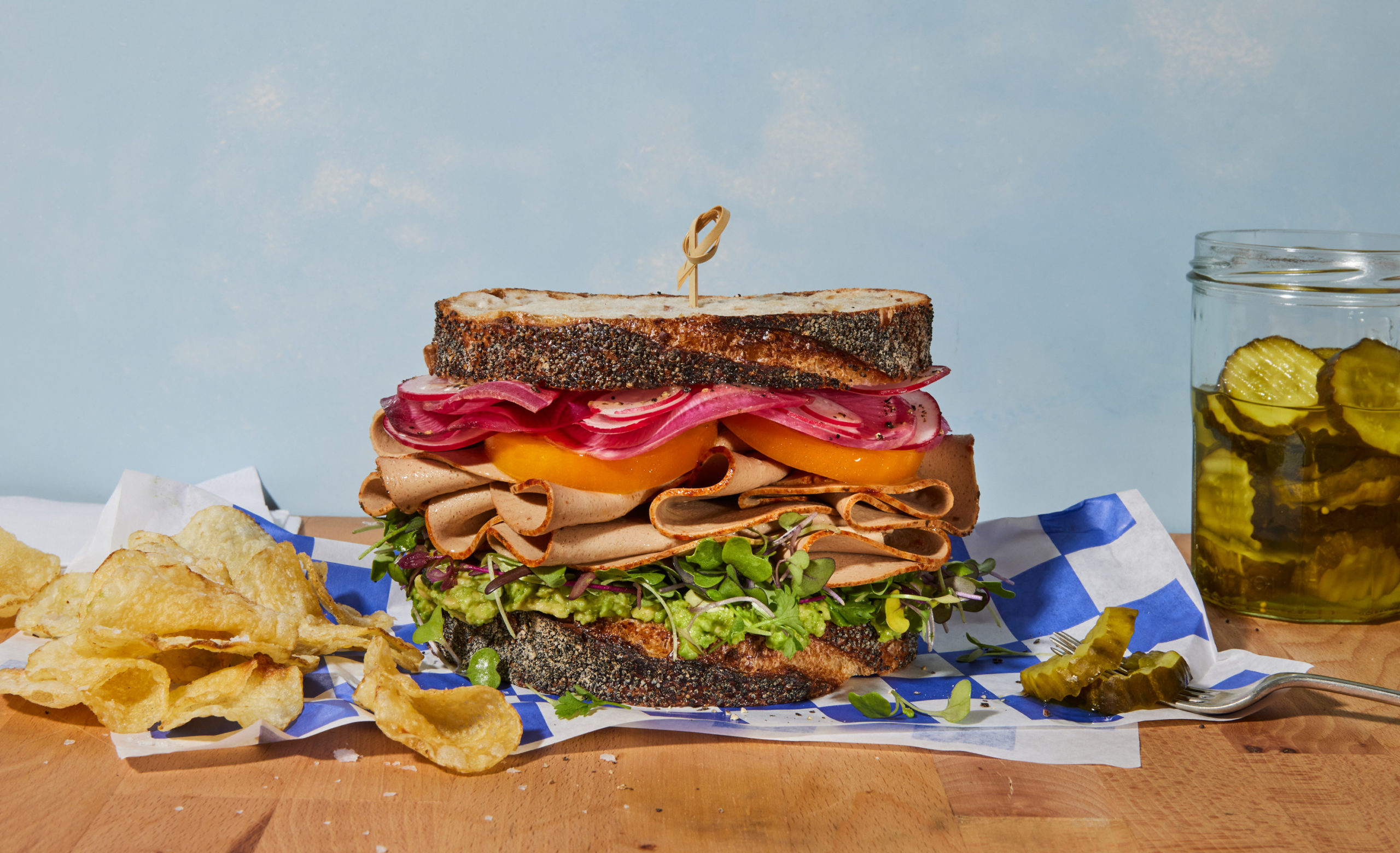
Quorn pioneered the mycoprotein category, and its new partnership with Prime Roots, which relies on koji mycelium —Japan’s “national yeast” — for its vegan meat, will see both companies expand their reach and product range.
The companies say they will collaborate on new product offerings using their novel mycelium tech. Quorn’s products currently dominate the frozen category while Prime Roots has targeted the deli case since its launch in 2017; it offers vegan versions of turkey, ham, salami, pepperoni, and bacon as well as pâté and foie gras.
Kimberlie Le, Prime Roots’ Co-founder and CEO, expressed enthusiasm about the partnership: “We are thrilled to partner with Quorn, the leader in mycelium-based proteins to create breakthrough innovations together and to bring great tasting foods that are better for you and for the planet to mass markets,” Le said in a statement.
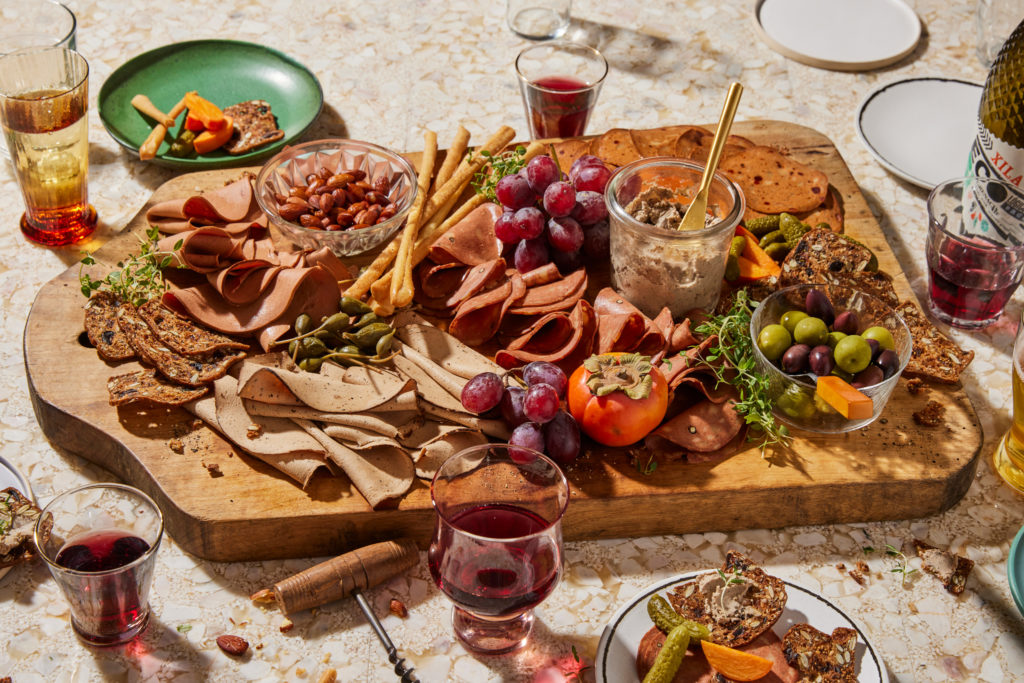
“Prime Roots is doing great things in developing the U.S. meat-free deli category, and we’re excited by the opportunity we now have to share knowledge and collaborate with Kimberlie and her team,” said Quorn’s CEO, Marco Bertacca.
The alliance announcement comes in the wake of Prime Roots’ recent $30 million Series B fundraise aimed at escalating production for nationwide distribution.
“People are asking for sustainable meat options that taste good, make them feel good, and do good with less planet impact,” Le said in a statement accompanying the Series B announcement. “Prime Roots delivers on all three: taste, nutrition, and sustainability.”
According to Le, the recent funding is an indicator that there is a growing market demand for alternatives to conventional meat.
The news also comes on the heels of recent research published in the European Journal of Nutrition looking at Quorn’s health benefits, particularly on the propagation of friendly gut bacteria. The research, published in February, found that the study participants who consumed mycoprotein had “statistically significant” decreases in biomarkers for colon cancer than the group that did not consume the mycoprotein.
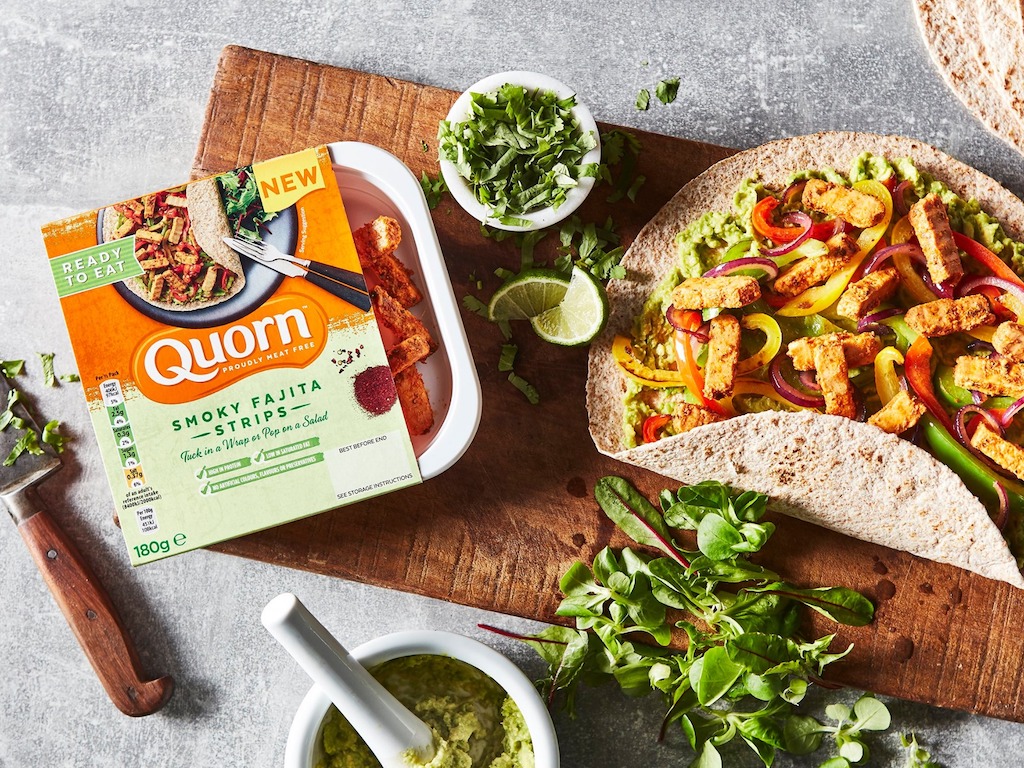
“The study showed that this dietary change delivers a significant reduction in genotoxicity and an increase in beneficial gut microbes,” the researchers noted. “Our findings suggest therefore that this high-fiber protein source provides a good alternative to meat in the context of gut health and could help to reduce long-term bowel cancer risk.”
Other research, published in 2019, found that Quorn’s mycoprotein increased muscle building in participants at more than double the rate of the group who consumed dairy.
“These results are very encouraging when we consider the desire of some individuals to choose non-animal derived sources of protein to support muscle mass maintenance or adaptations with training,” said Dr. Benjamin Wall, Associate Professor of Nutritional Physiology, University of Exeter.
“Our data show that mycoprotein can stimulate muscles to grow faster in the hours following exercise compared with a typical animal comparator protein (milk protein),” he said.
Last week, Quorn’s UK parent entity Marlow Ingredients announced a collaboration with Danish food start-up Tempty Foods to introduce a range of meat alternatives featuring mycoprotein, the fungus-derived “super protein” the company says is more sustainable than conventional protein sources.
The post Quorn Foods And Prime Roots Partner To Expand Mycelium Meat Category first appeared on Green Queen.
The post Quorn Foods And Prime Roots Partner To Expand Mycelium Meat Category appeared first on Green Queen.
This post was originally published on Green Queen.
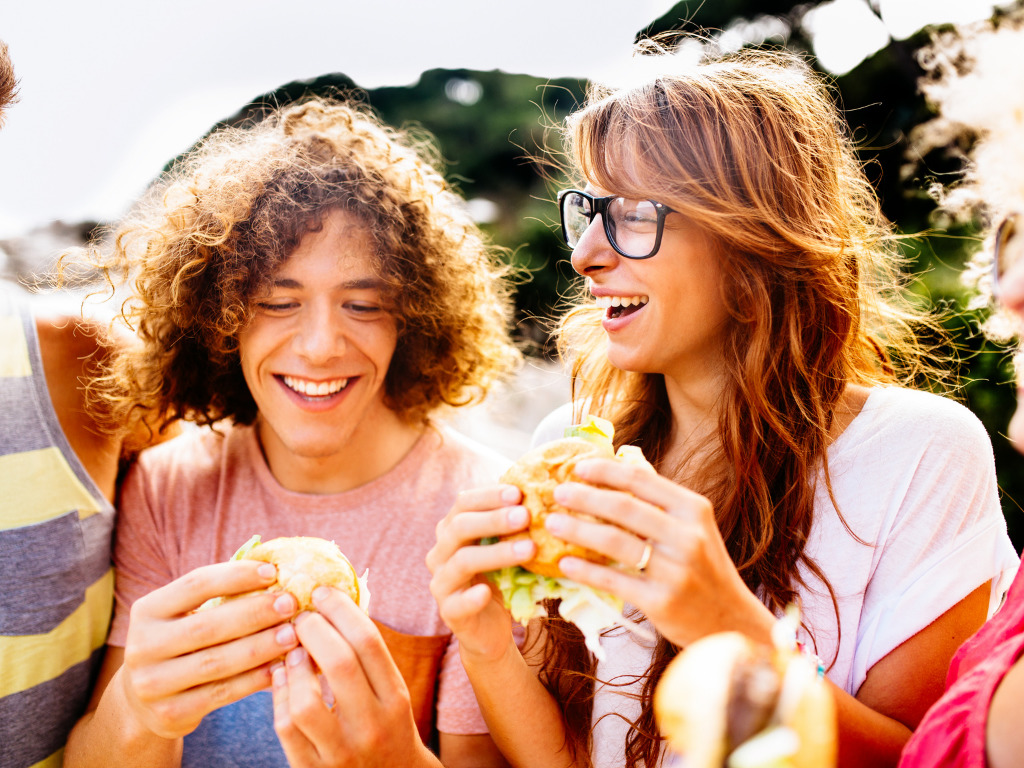
The collaboration marks Dyadic’s first venture with an Indian entity for non-pharmaceutical uses on its renowned Dapibus platform. The partnership leverages the product development and process engineering expertise of Fermbox Bio, coupled with Dyadic’s proprietary filamentous fungal-based protein production platform, aiming to design, manufacture, and commercialize ground-breaking, animal-free alternative proteins and biomaterials.
Dyadic International Inc. and Fermbox Bio are both dedicated to creating sustainable and commercially viable products. Fermbox Bio is known for co-developing, manufacturing, and commercializing biomaterials for global markets, whereas Dyadic International Inc. is at the forefront of creating microbial platforms to meet the global demand for protein bioproduction and alternative proteins.

“We are very excited to partner with Dyadic to bring our complementary skills to action and use its novel Dapibus platform to create alternative biomaterials that are not only sustainable but also economically viable,” Subramani (suBBu) Ramachandrappa, Ferbox’s founder, said in a statement.
“Our joint expertise across expression systems and execution capabilities from lab to large-scale manufacturing, uniquely positions us for success. We have a long-standing relationship with Dyadic leadership, and we believe that this co-development agreement can potentially accelerate the timelines for both companies to bring new and commercially viable bio-alternates to the market sooner.”
Fermbox Bio, operating in both India and the U.S., is strategically positioned for global collaborations, benefiting from access to Indian scientific talent and manufacturing capacities. This collaboration, along with India’s prowess in gene expression, enzymatic pathway engineering, and low-cost manufacturing, could thrust the alternative protein sector forward, positioning India as a potential global supplier.
“I am excited to announce this fully funded co-development and marketing agreement with Fermbox which is consistent with our business strategy of focusing on near-term commercialization opportunities that can create shareholder value,” said Joe Hazelton, Chief Business Officer of Dyadic.
“Fermbox has extensive expertise in bio-alternatives development and microbial precision fermentation which we expect will accelerate our ability to exploit the Dapibus platform and expand Dyadic’s product offerings for non-pharmaceutical alternative proteins applications, such as food, nutrition, wellness, and other bioproducts,” Hazelton said.

“We anticipate this collaboration will enhance our market penetration into the alternative protein markets, while at the same time continuing to pursue our biopharmaceutical activities which are advancing at a rapid pace. We believe that this collaboration will further leverage our proprietary Dapibus platform toward developing and commercializing multiple end-market animal-free protein products.”
This collaborative model is setting a precedent, according to Nicole Rocque, Senior Innovation Specialist at The Good Food Institute (GFI) India. She says that a co-development partnership of this kind highlights the emerging role India can play in the global SynBio industry. “India has the potential to be a leader in the development of sustainable alternatives that have the potential to feed a growing population while showcasing a model of growth for other emerging markets.,” Rocque said.
The post Fermbox Bio and Dyadic International Announce a Global Partnership for Sustainable Bio-Alternatives first appeared on Green Queen.
The post Fermbox Bio and Dyadic International Announce a Global Partnership for Sustainable Bio-Alternatives appeared first on Green Queen.
This post was originally published on Green Queen.
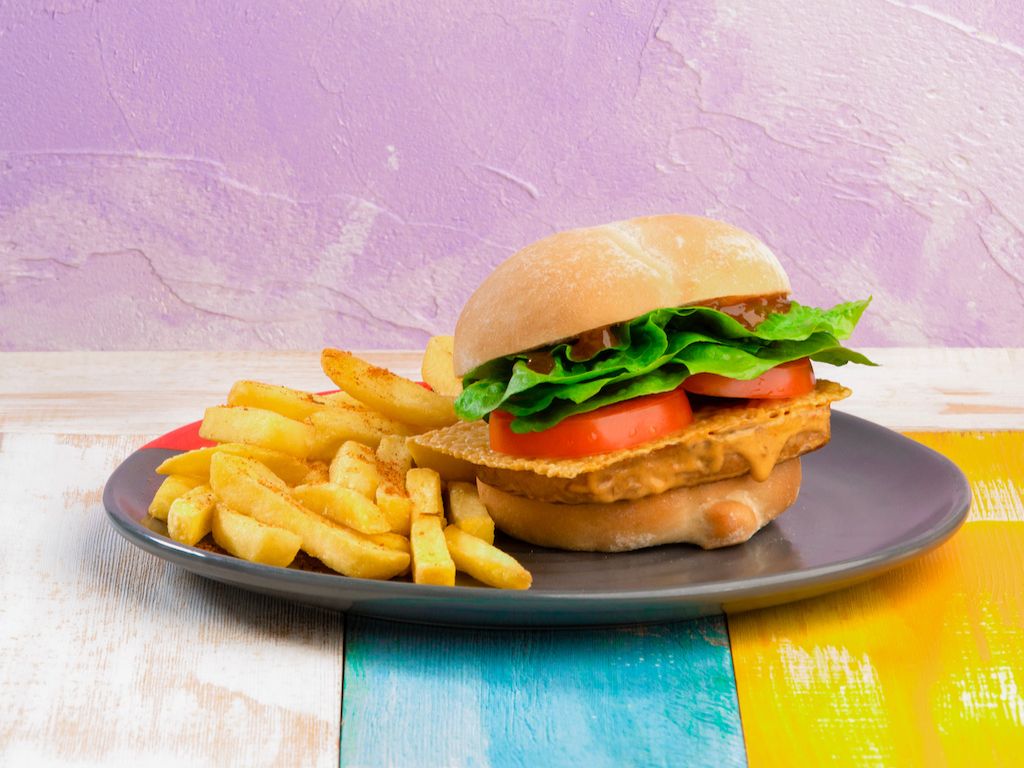
The announcement marks the first time Nando’s, the South African-based chicken chain, has launched a plant-based menu option in Singapore. The new meatless Green Rebel Chick’n Steak is part of Nando’s “The Great Pretender” campaign.
The new sandwich contains 18 grams of protein per serving and 7 grams of fiber — about the equivalent of 250 grams of spinach. The sandwich is rolling out to all six Nando’s locations in Singapore.
The partnership marks a milestone for Green Rebel, which launched in Singapore last year. The company’s products are available in 1,500 locations across Singapore, Indonesia, South Korea, Malaysia, and the Philippines.
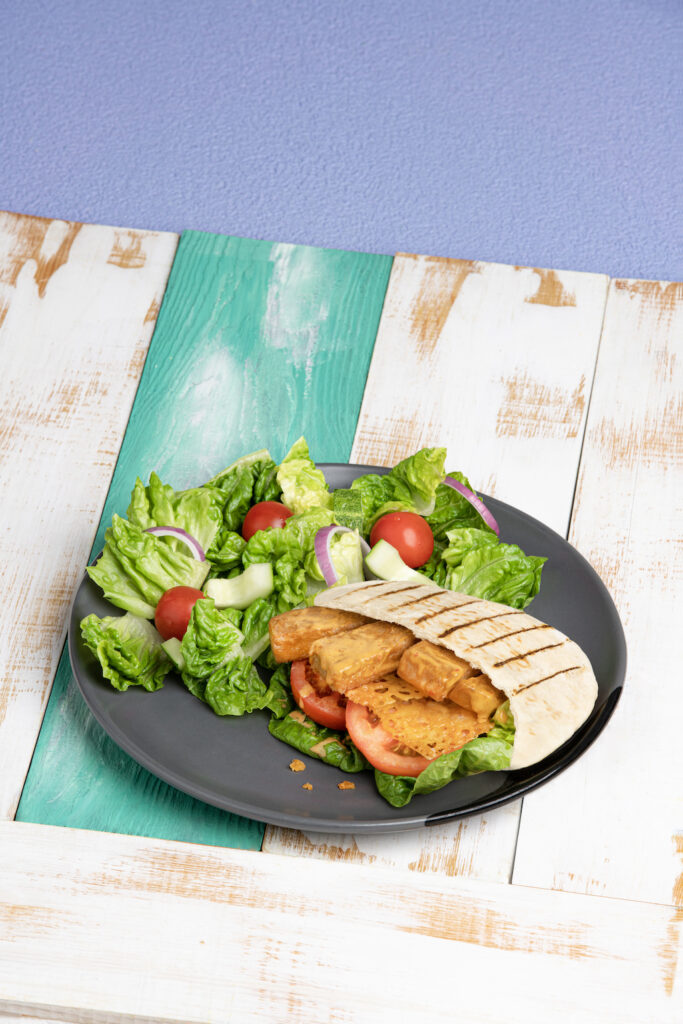
“The way to convince more people in Asia to try plant-based foods is with products that work great in favourite local dishes,” Michal Klar, general partner at Better Bite Ventures told Green Queen last year following Green Rebel’s Series A funding round. “Green Rebel is doing exactly that by offering plant-based meats with authentic flavours like Indonesian beef rendang, chicken satay and more.”
Last November, the company announced its expansion into the nondairy category with the launch of cheese, sauces, and dressings.
Singapore is increasingly cementing itself as a launch pad for vegan products. A confluence of increased consumer consciousness about environmental sustainability and ethical consumption has seen a rise in the demand for plant-based and alternative protein options across the nation. Singapore’s innovative, tech-forward business climate is ideal for the development and promotion of such products.
Most recently, Dutch food technology pioneer Meatable hosted its first-ever cultivated meat-tasting event in Singapore — the only country that has approved cultivated meat for sale and consumption.
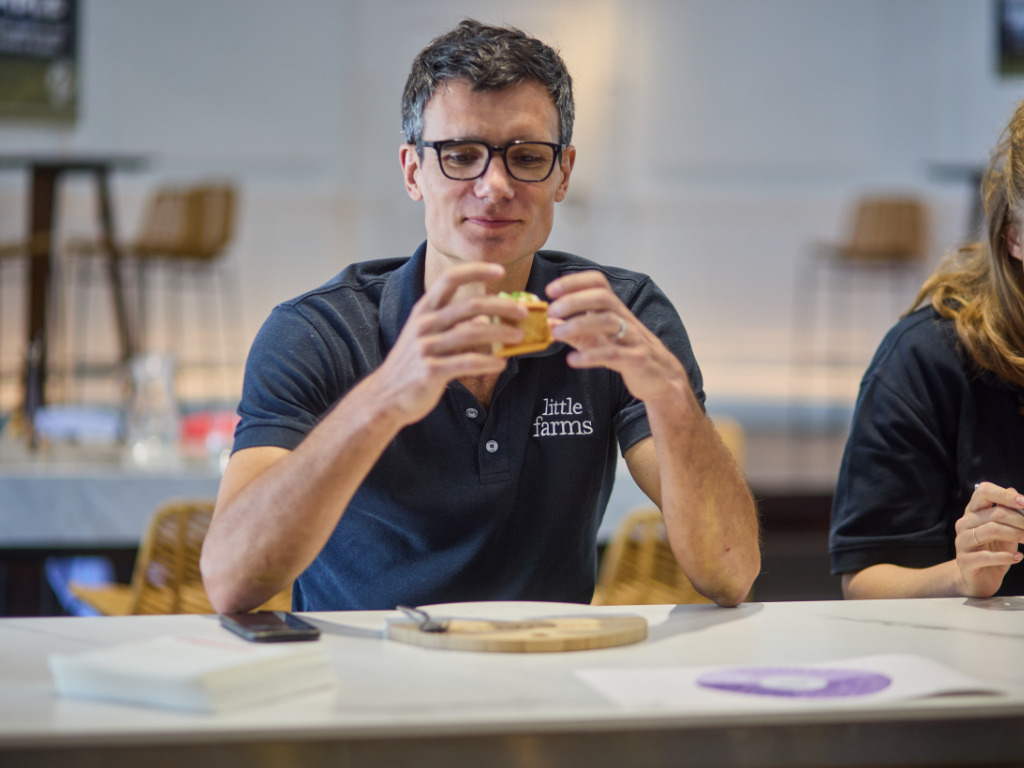
Startups and multinational corporations alike are capitalizing on the opportunity. Recognizing Singapore’s potential, they’re launching an array of vegan alternatives, from lab-grown meat to plant-based dairy and egg substitutes. The government is also supportive of this burgeoning sector, contributing funds and resources for research and development in the food-tech industry.
Crucially, Singapore’s status as a cosmopolitan city, with its diverse population and culinary tastes, makes it a fertile testing ground for new vegan products. Businesses are able to reach a broad spectrum of consumers and gain insightful feedback to continually improve their offerings.
Furthermore, Singapore’s strategic location in Asia allows companies to expand into other markets in the region easily. Its role as a launch pad for vegan products underscores its broader ambition to become a leader in sustainable and innovative food solutions. This trend is likely to continue as the global demand for vegan and plant-based products grows.
The post Green Rebel’s Vegan Chicken Launches At Nando’s Singapore first appeared on Green Queen.
The post Green Rebel’s Vegan Chicken Launches At Nando’s Singapore appeared first on Green Queen.
This post was originally published on Green Queen.

The new collaboration brings to market a line of shelf-stable products that incorporate Harvest Gourmet’s vegan ingredients sourced domestically. DayDayCook has traditionally focused on meal delivery kits for the home chef.
“I am super excited to see this collection launch and come to life,” Norma Chu, Founder and CEO of DayDayCook, said in a statement.
The focus of the new vegan meat product range is to create something “special yet accessible” DayDayCook says. “We want to wow [customers] and bring them back to the fundamental of eating delicious and healthy meals with a dash of nostalgia for flavor.”
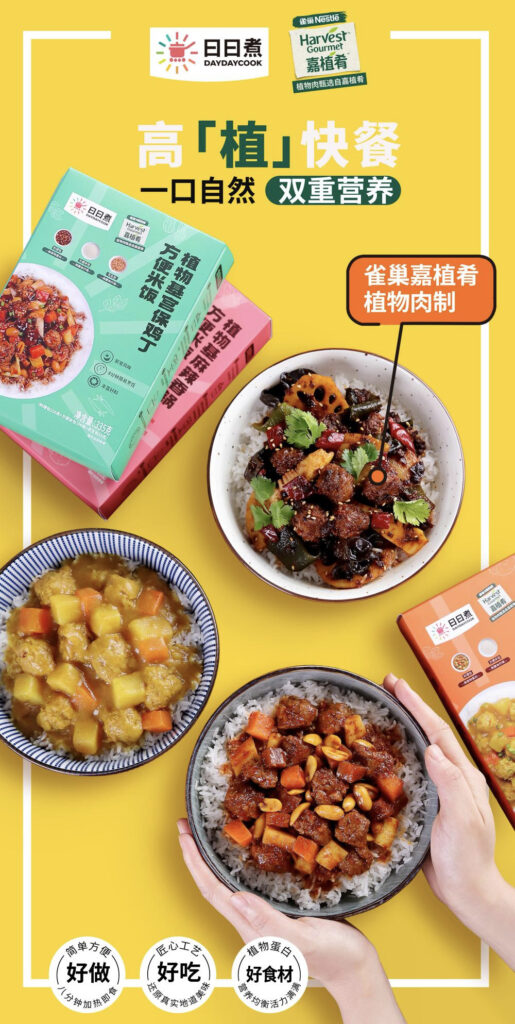
According to the company, the partnership with the Nestlé R+D Accelerator worked to develop foods that will resonate in a positive way with the Chinese audience as well as create a buzz within the plant-based market.
“We have been so honored to have the privilege of working with Nestlé, the largest food company in the world,” DayDayCook said. “During this process, we tried the full range of [plant-based meat] ingredients produced domestically by Nestlé China. With such a strong root in R&D, we were impressed by how much variety of plant-based ingredients were readily available. Then, we took it upon ourselves to create the most delicious and easy-to-make meal kits with these Harvest Gourmet ingredients.”

Last December, Singapore’s Float Foods, known for its egg replacement OnlyEg, partnered with DayDayCook to bring its vegan egg to its Hong Kong consumer base.
“People have enjoyed the experience of cooking and eating at home but are also hard-pressed for time and energy. The OnlyEg Meal Kits offer the chance to elevate the dining experience by introducing clean, contemporary, healthy meals,” Norma Chu, Founder, and CEO of DayDayCook, said in a statement. “Eating a healthy protein-rich meal should be accessible to everyone and bring a sense of celebration at the same time.”
The post Hong Kong’s DayDayCook Partners With Nestlé on Shelf-Stable Vegan Meal Range first appeared on Green Queen.
The post Hong Kong’s DayDayCook Partners With Nestlé on Shelf-Stable Vegan Meal Range appeared first on Green Queen.
This post was originally published on Green Queen.
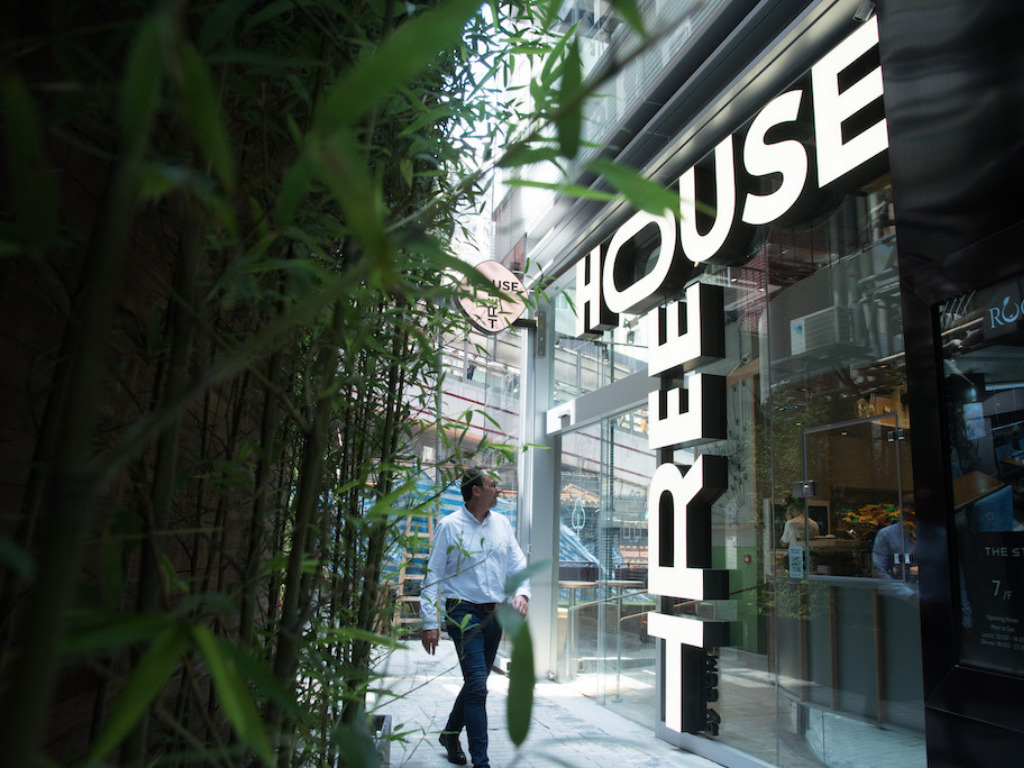
With its third location now up and running, Hong Kong’s Treehouse doubles down on its commitment to bring sustainable, delicious food to the region.
The new location is located in the heart of the city’s business district, where Treehouse says it hopes to reach consumers in need of a fast-casual dining experience with a focus on sustainability and a plant-forward ethos.
“The main contributors of ecological and climate destruction are largely tied to consumer and industry behavior,” Treehouse says. Founder and chef Christian G. Mongendre puts a focus on fixing these “systemic errors” by making delicious, nutritional food using high-quality, local ingredients that he says are accessible to everyone.

“From the smallest details in menu development to technological upgrades in the venues,” Treehouse says Mongendre has his finger “on every pulse of innovation, covering eco-sustainability, health, and efficiency.”
The new Treehouse location offers guests a unique dining experience in a restaurant location that integrates and pays homage to nature. The new location was designed by the award-winning studio Stefano Tordiglione Design. The restaurant features a blend of mirrors, aluminum, and stainless steel that help guests feel suspended in a treehouse.
The menu is free from processed foods including preservatives, artificial sweeteners, and other unhealthy ingredients. New menu items include Spruce Pho Soup made from anise-clove broth, avocado, kelp noodles, bean sprouts, seasonal vegetables, Thai basil, lime, and chili.
The attention to detail is crucial, according to Mongendre in order to bring quality, conscious businesses to the mainstream. Mongendre is behind eight Hong Kong restaurants and one in Portugal.
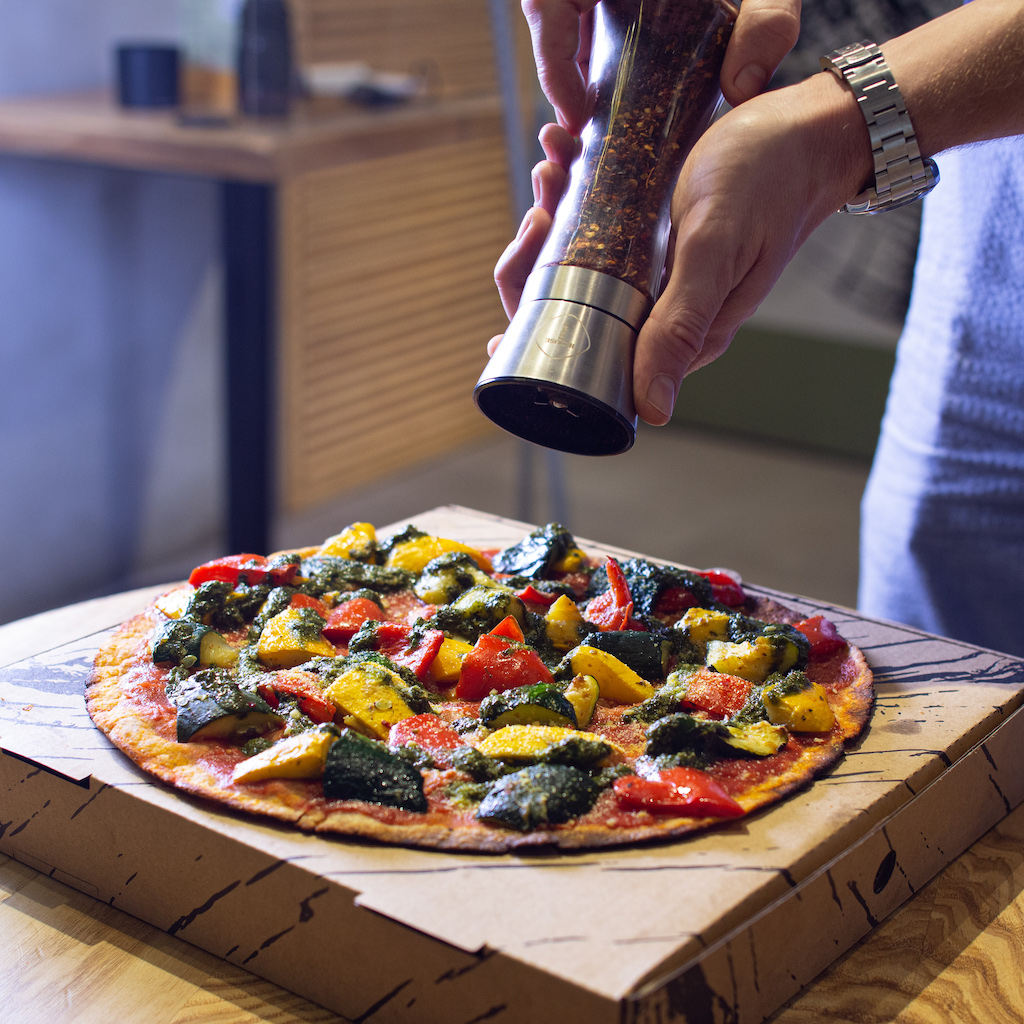
Hong Kong has seen a recent rise in sustainable food efforts. Last month, the Sustainable School Summit saw students and industry leaders convene to explore options for reducing the carbon footprint of regional school meals.
Also last month, Planet for All, a Hong Kong-based non-profit animal protection organization, launched its first public education campaign to promote plant-based milk. That partnership will see it work with 30 regional restaurants to make dairy-free options more accessible.
The post Hong Kong’s Plant-Forward Restaurant Chain Treehouse Expands first appeared on Green Queen.
The post Hong Kong’s Plant-Forward Restaurant Chain Treehouse Expands appeared first on Green Queen.
This post was originally published on Green Queen.
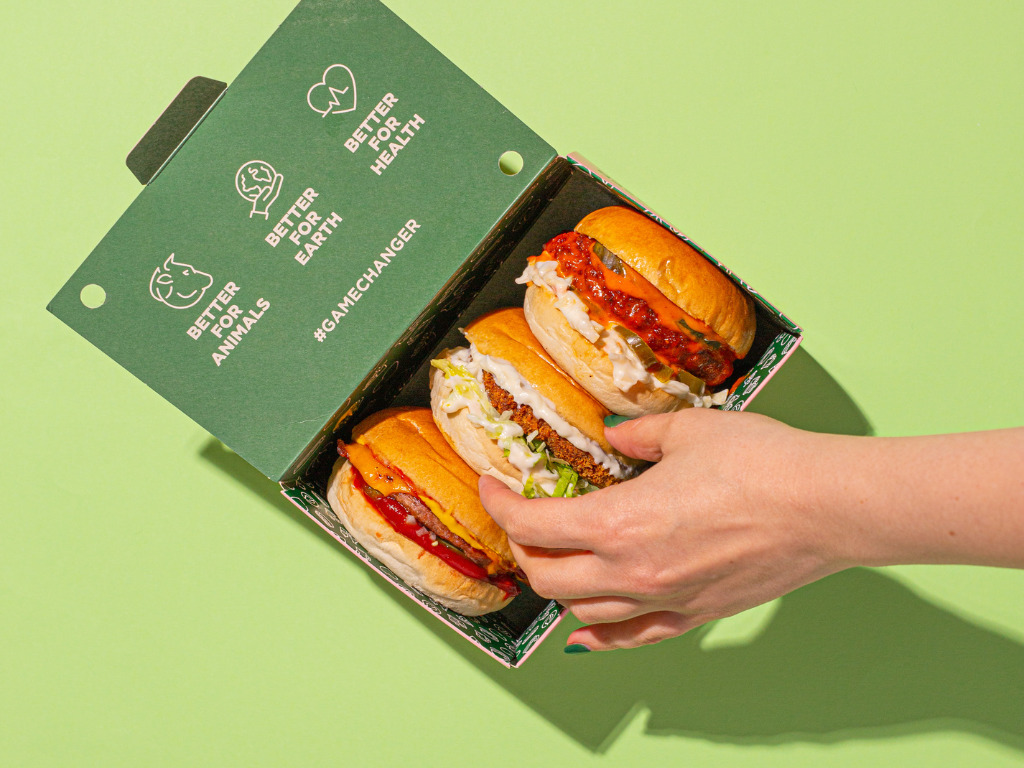
Despite the challenging macroeconomic backdrop, Neat Burger has emerged as a leading player in the plant-based food industry. The recent fundraise saw Formula One Champion Lewis Hamilton reinvest, alongside Chimera Capital. Notable new investors include LionTree, New Theory Ventures, Real Madrid goalkeeper Thibaut Courtois, and model and actress Sara Sampaio.
Since its launch in 2019, Neat Burger has rapidly grown to become one of the world’s fastest-growing plant-based food groups and has garnered a reputation for its pioneering approach to appeal to both flexitarian and plant-based consumers.
The company’s focus on high-quality, fresh ingredients without compromising on taste has helped to make plant-based eating accessible and enjoyable for its customers. Neat Burger’s purpose is to offer ethical, sustainable, and delicious plant-based food served with passion and style.
“We are thrilled to have reached this major milestone in Neat Burger’s journey with a successful fundraise from previous investors alongside an impressive group of new investors,” Tommaso Chiabra, Co-Founder of Neat Burger, said in a statement.
“This is a pivotal moment for our business, and it allows us to accelerate our growth plans. With the successful launch of our New York location and record first quarter under our belt, we have demonstrated the strength of our brand, and are now well-positioned to bring our award-winning plant-based food to the growing number of consumers in the U.S. and worldwide who are embracing a healthier and more flexitarian lifestyle,” said Chiabra.
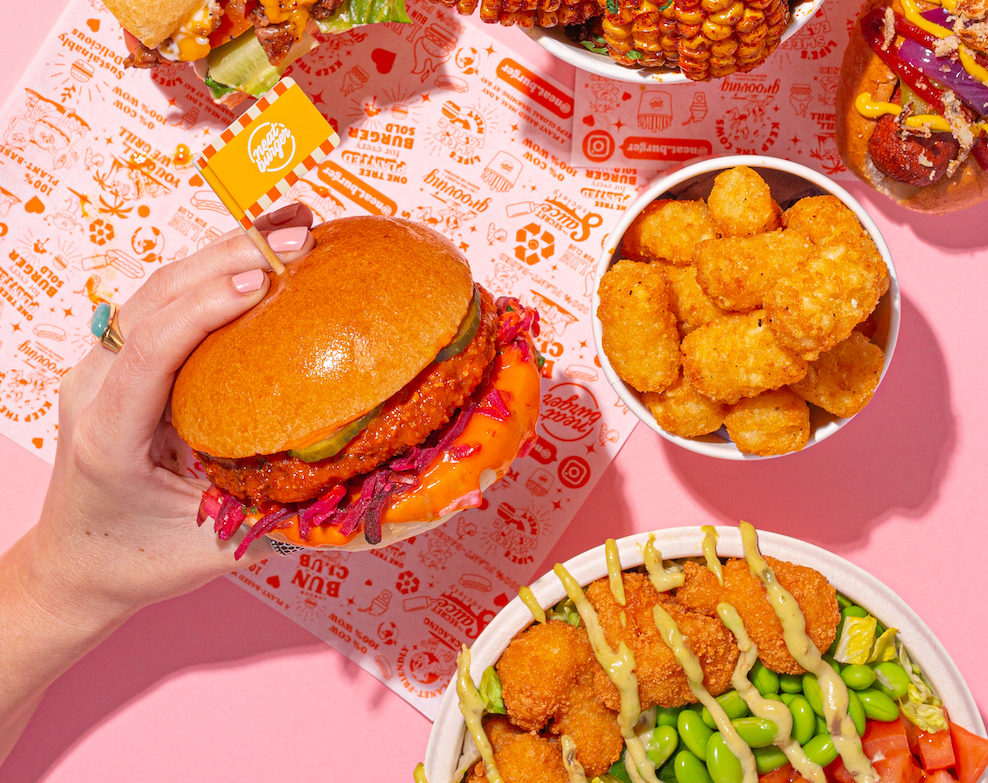
Leading the round is B-Flexion, a private institutional investment firm founded by Ernesto Bertarelli, which focuses on sustainability.
“I love how Neat Burger is on a mission to make plant-based eating more accessible to everyone,” Chiara Bertarelli said om a statement. “Our generation is paving the way and driving this change, with research showing once Gen-Z adopt a vegan or flexitarian diet, 70 percent stick with it. So, the key is getting people to try it and integrate it into their daily lives. First impressions count and Neat Burger’s approach, combining fun and sustainability, has the potential to change the world.” Bertarelli is a recent Harvard University graduate and will now serve as Neat Burger’s Sustainability Advisor.
The investor support not only recognizes Neat Burger’s growth potential but also acknowledges its unique and innovative approach. Neat Burger prioritizes an engaging restaurant experience that inspires consumer curiosity and encourages the adoption of a meat-free and flexitarian lifestyle. The group’s London restaurants have shown record-breaking performance in the first quarter of this year, with like-for-like sales up by 20 percent.
Central to Neat Burger’s menu are its fully plant-based offerings, providing health-conscious consumers with guilt-free options for enjoying all-American burger classics. The Neat Burger patty is crafted with a blend of nutritious superfoods such as mung beans, quinoa, and chickpeas, and is rich in healthy fats and protein.
Earlier this year, Neat Burger made its U.S. debut in New York. “We see New York as a tastemaker gateway to the U.S. and by all metrics it has been our most successful launch to date,” said Zack Bishti, Co-Founder and CEO of Neat Burger. First-month sales exceeded expectations, making it the best-performing store in the entire Neat Burger portfolio.
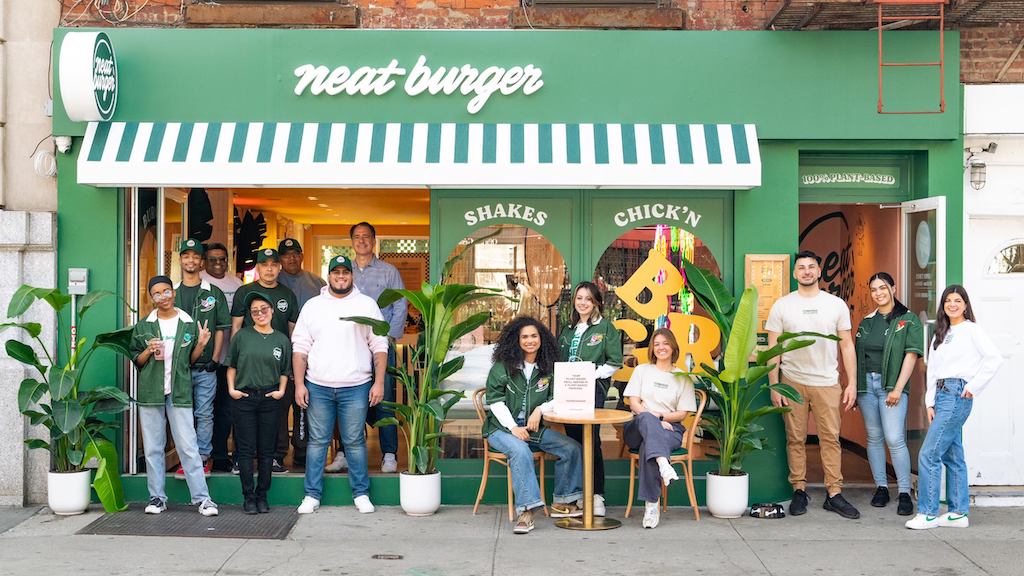
“New Yorkers have good taste and strong opinions and we’ve been thrilled to see customers continually return,” said Bishti. “We’re at the heart of the growth in plant-based diets and our proximity to the customer voice sets us apart. In response to the growing demand for cleaner ingredients, we’ve incorporated healthier options into the New York menu, while continuing to serve our growing community food that’s as sustainable as it is delicious.”
The chain is also expanding with restaurant launches in Italy and the Middle East. Additionally, the company is growing its business-to-business vertical by forming partnerships with hospitality groups and businesses aiming to achieve net-zero targets by shifting to plant-based offerings.
The success of Neat Burger is reflected in its growing fanbase and also in widespread industry recognition. The company has been honored with the prestigious U.K.’s Best Vegan Restaurant of the Year award at the Deliveroo Restaurant Awards for two consecutive years. These accolades highlight the positive response and acceptance of Neat Burger’s innovative approach to plant-based dining.
The post Lewis Hamilton-Backed Neat Burger Secures $18 Million Series B: ‘A Major Milestone’ first appeared on Green Queen.
The post Lewis Hamilton-Backed Neat Burger Secures $18 Million Series B: ‘A Major Milestone’ appeared first on Green Queen.
This post was originally published on Green Queen.
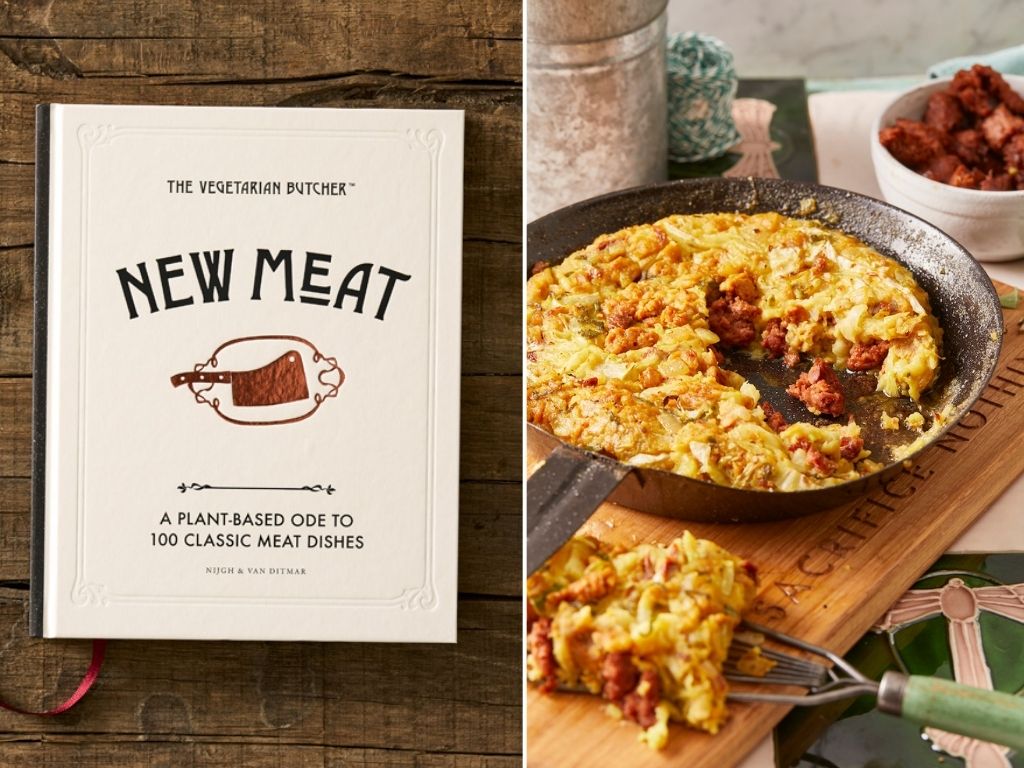
The new cookbook builds on the success of the Vegetarian Butcher’s offerings since it launched in 2010. “New Meat” features 100 classic meat dishes made for “open-minded meat lovers.”
The book builds on the success of The Vegetarian Butcher, which started out in The Hague, offering meat-free options out of a butcher shop after ninth-generation farmer and meat lover Jaap Korteweg gave up eating meat. The company has been a leader in replicating sausage, mince, and burgers, with placement in 55 countries and more than 40,000 retail outlets.
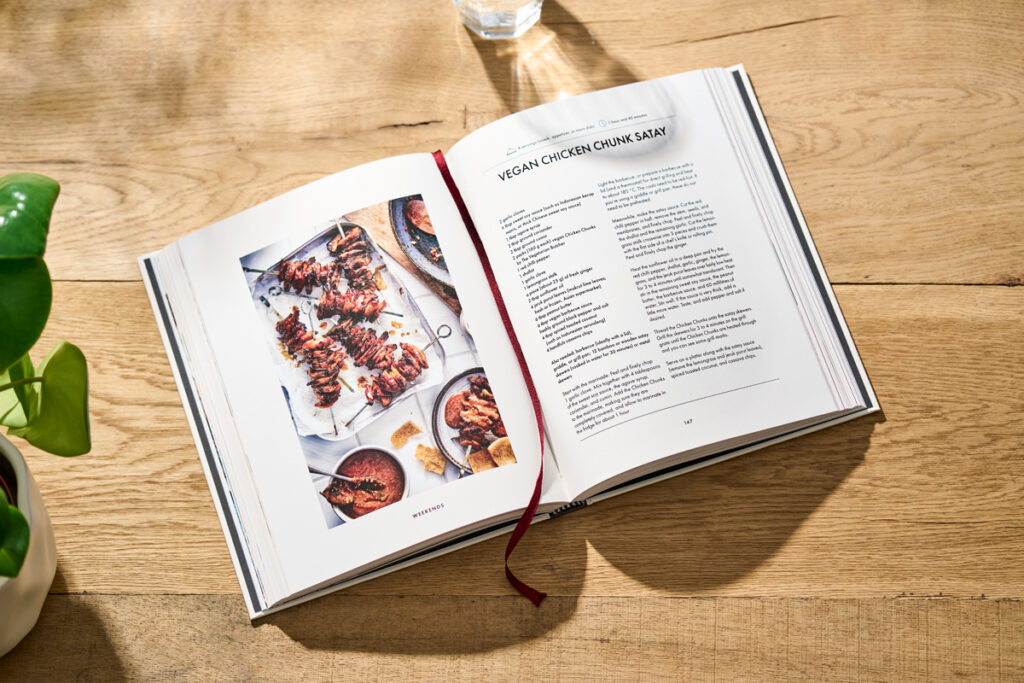
“I was hooked on the taste of meat and my idea was how we can produce meat without animals with the same taste, the same texture, the same experience,” Korteweg told the World Economic Forum in 2019.
“People like meat,” says Korteweg. “But it’s not necessary to live without it, you can eat as much meat as you want, without the use of animals.”
The book features recipes from Korteweg along with a range of contributions from eleven top chefs including those from Michelin-starred chefs Asimakis Chaniotis, the executive chef at Pied à Terre in London; James Goodyear, the head chef at Adam’s; Ricky Saward chef at Seven Swans in Frankfurt, the first vegan restaurant in the world to be awarded a Michelin star and Michelin green star for sustainability; and Andrew Pern, chef and owner of the Star in North Yorkshire.

“New Meat” aims to spotlight the diversity plant-based meat offers. It features five of the Vegetarian Butcher products including vegan Chicken Chunks, the vegan Raw Burger, vegetarian Meatballs, vegan Chicken Breast, and the vegan Crispy Chicken Burger.
The book features cooking tips and tricks for working with plant-based ingredients on recipes including vegan Wellingtong, Bourguignon, and Indian Butter Chicken. “All of them showcasing the best of plant-based, sacrificing nothing in terms of taste, texture and traditions.”
Recipes cover five categories: Weekdays; Breakfast, Brunch & Lunch; Weekends; Snack Time; and Classics. Most of the recipes were developed by recipe developers, food stylists, and lifelong cooks José van Mil and Fleur van Mil, and photographed by Remko Kraaijeveld.
The post The Vegetarian Butcher Taps Michelin Chefs for Its First Cookbook first appeared on Green Queen.
The post The Vegetarian Butcher Taps Michelin Chefs for Its First Cookbook appeared first on Green Queen.
This post was originally published on Green Queen.
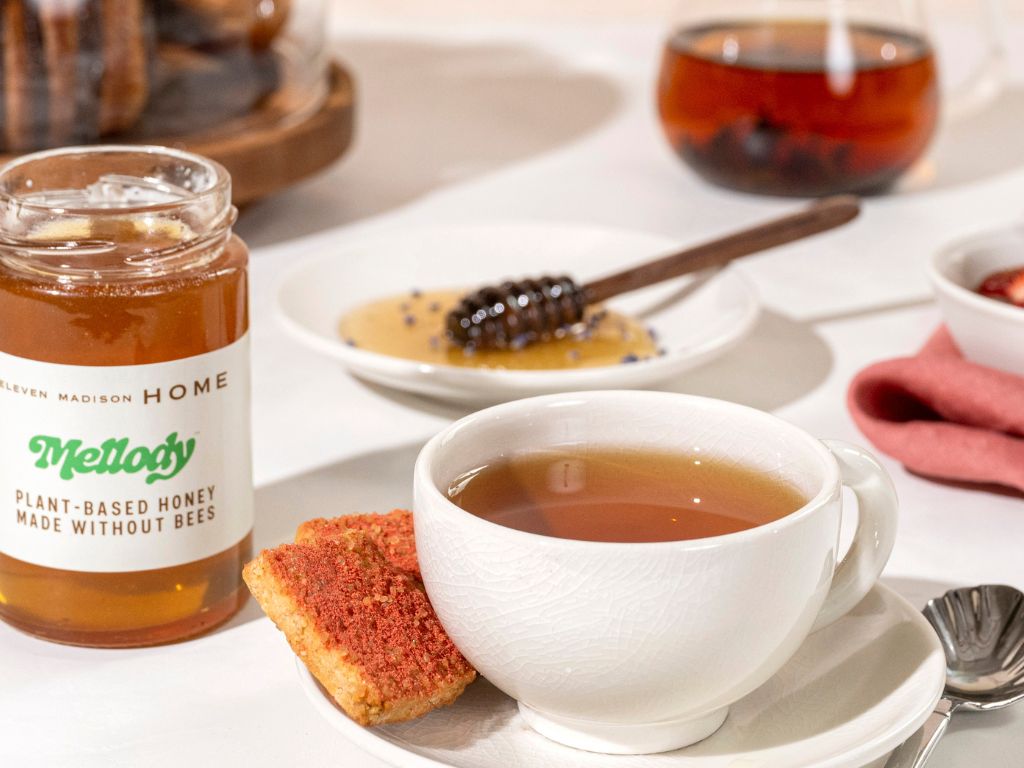
2 Mins Read
Following up from its debut at the Natural Products Expo in Anaheim, Calif., last month, Mellody will be available as part of the Eleven Madison Home’s Tea & Honey box.
The collection features honey oat shortbread cookies made with Mellody honey, one jar of Mellody plant-based honey, a honey dipper, and three single-origin teas from In Pursuit of Tea: Himalayan Black, Thunderdragon Green, and Elderflower.
The culinary team at Eleven Madison Home is also developing an infused flavor of the Mellody plant-based honey that will be released in the next month as a duo with the original flavor.
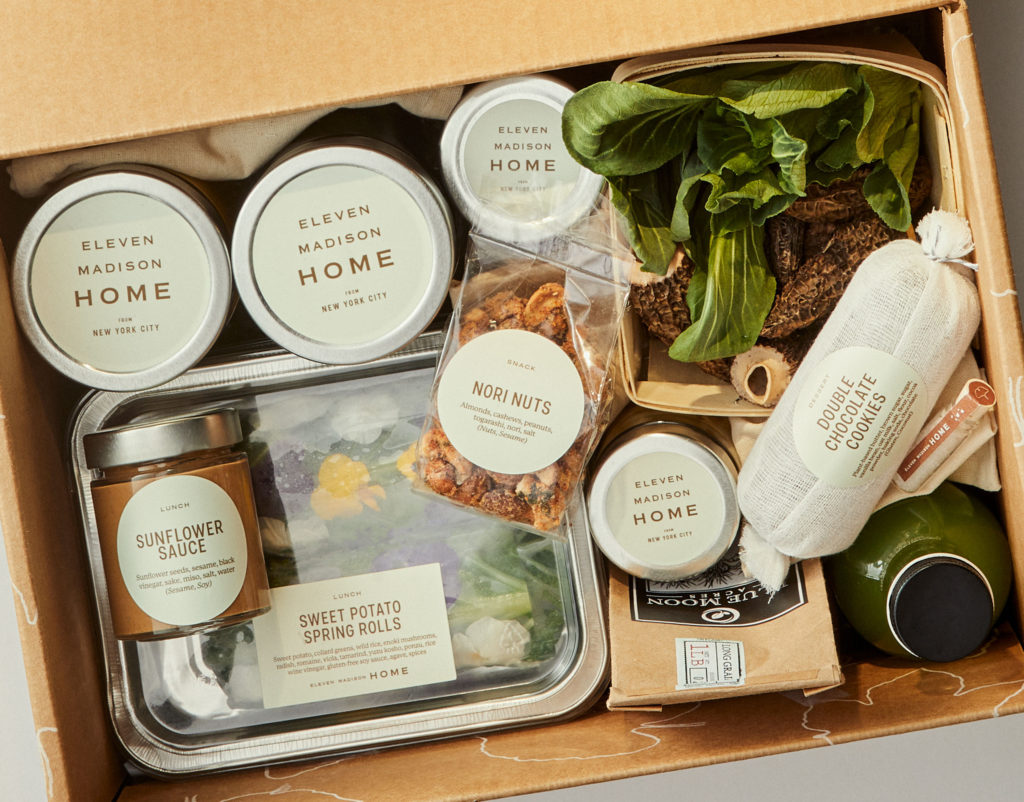
“We were blown away by the quality of Mellody and were excited at the possibilities of how we can incorporate it into our kitchen through recipes and products,” Eleven Madison’s Director of Operations Chef Daniel Distefano, said in a statement.
“A plant-based diet can often be seen as limiting. This product and what we’re doing with Eleven Madison Home goes a long way to discredit that notion,” he said.
Melibio created Mellody to provide a vegan alternative to honey but also to help protect the world’s pollinator populations. The company says its plant-based honey addresses critical environmental issues caused by the commercial honey industry.
“Native bees are critical to food production and biodiversity conservation, but they are under increased pressure due to fierce competition from invasive European honey bees,” Melibio says.
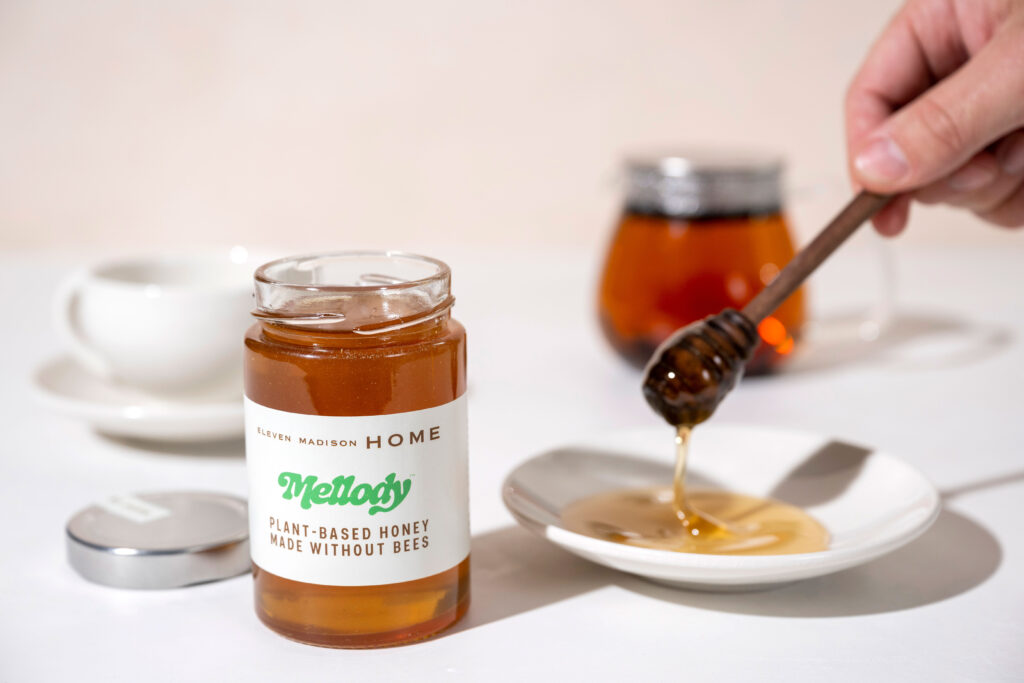
“Many people are unaware of the issues surrounding commercial honey production and its impact on the 4,000 native bees in the US,” said Darko Mandich, co-founder and CEO of MeliBio. “By providing restaurants and consumers with a delicious and sustainable alternative, we hope to help restore ecological harmony and make room for native pollinators.”
Melibio says its Mellody honey is “molecularly identical” to conventional honey, so users experience the same taste, smell, look, and texture that they’re expecting from a honey product. The vegan honey works just like conventional across applications, and is “a vegan’s best friend in terms of sweetener,” Mandich says.
The post Melibio’s Bee-Free Mellody Honey Makes Its Retail Debut at Eleven Madison first appeared on Green Queen.
The post Melibio’s Bee-Free Mellody Honey Makes Its Retail Debut at Eleven Madison appeared first on Green Queen.
Today, supporters of PETA and Switch4Good are kicking off a weeklong push for Starbucks to drop its “penalty charge” for dairy-free milk, culminating in a sit-in with Animal Rights Initiative at a local Starbucks store on Monday. Accompanied by a social media uproar and protests in 23 cities across North America, the week of action follows PETA’s recent shareholder resolution challenging the surcharge, which won so many votes that PETA can and will submit it for a new vote in 2024.
When: Monday, April 17, 11:30 a.m.
Where: Starbucks, 2200 N.W. Market St., Seattle
The animal advocacy groups point out that the surcharge penalizes customers who want to help prevent abusive dairy industry practices and slash greenhouse gas emissions. Charging extra for vegan options is also an unfair practice that perpetuates dietary racism, given that 80% of Black and Indigenous Americans and more than 90% of Asian Americans are lactose intolerant.
“Starbucks should encourage customers to choose environmentally responsible and animal-friendly vegan milks, not pimp them for extra profits,” says PETA Executive Vice President Tracy Reiman. “New CEO Laxman Narasimhan must take each of Starbucks’ social commitments seriously, whether it’s fighting racism or slowing the climate catastrophe.”
“Starbucks is lagging behind all the coffee chains that don’t charge customers extra for caring about their health or the health of the planet,” says Dotsie Bausch, Founder and Executive Director, Switch4Good. “With our Justice Cup campaign and other actions, we’ve been pressuring Starbucks to drop the nondairy surcharge for a couple of years. Now we’re proud to join hands with PETA to keep up the pressure because justice and compassion shouldn’t come with a price tag.”
In today’s dairy industry, cows are artificially inseminated (raped via an inserted syringe) and calves are torn away from their loving mothers within a day of birth. Male calves are often slaughtered for veal, and females are eventually sentenced to the same miserable fate as their mothers.
The groups will hold events today in Boston; New York City; Pittsburgh; Portland, Oregon; Toronto; and other cities. PETA and Switch4Good will take to the streets of Las Vegas and Little Rock, Arkansas, this weekend, followed by Chicago next week.
PETA—whose motto reads, in part, that “animals are not ours to eat or abuse in any way”—opposes speciesism, a human-supremacist worldview. For more information, please visit PETA.org, listen to The PETA Podcast, or follow the group on Twitter, Facebook, or Instagram.
The post ‘Brew Change!’ Week of Action Targets Starbucks’ Vegan Milk Penalty appeared first on PETA.
This post was originally published on Animal Rights and Campaign News | PETA.
The post If You Eat Fish, Other Animals Suffer And Die, Too. Go Vegan. appeared first on PETA.
This post was originally published on Animal Rights and Campaign News | PETA.
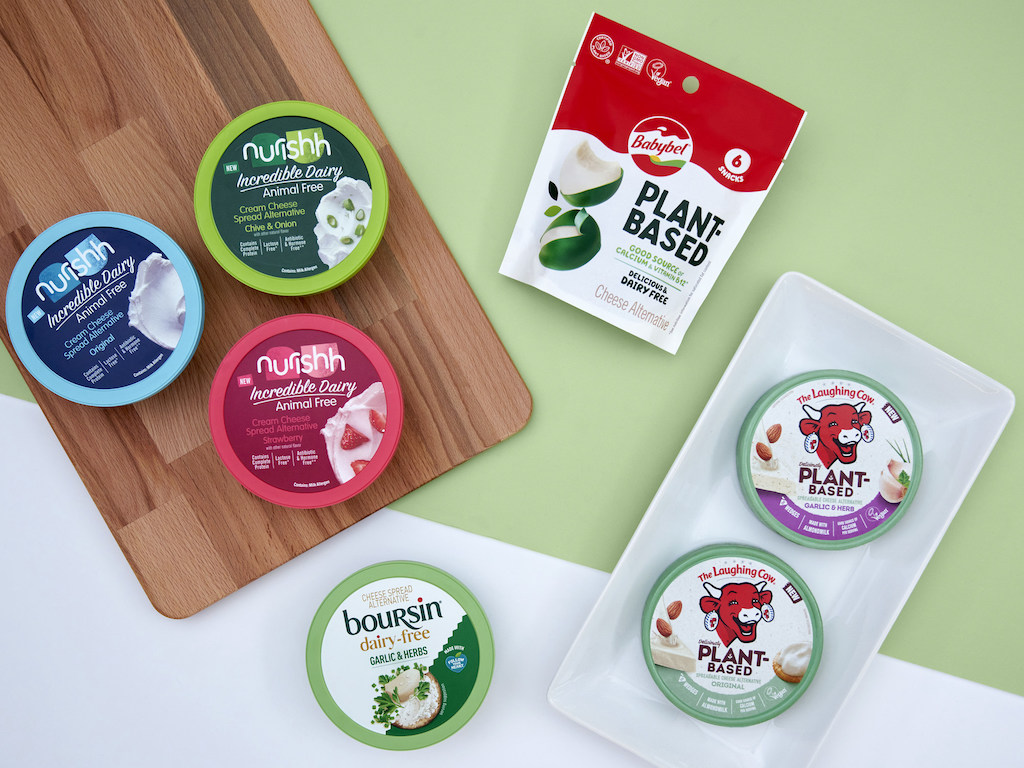
French global food plater the Bel Group, known for its popular branded cheese products, has announced a unique partnership with biotech Climax Foods with the aim to develop a new generation of plant-based cheese products to help address the challenges facing the dairy industry amidst a worsening climate cirsis. Their goal is to create plant-based versions of Laughing Cow®, Kiri®, Boursin®, Babybel®, and Nurishh® brand foods with a focus on making low-carbon footprint products nutritious, affordable and are indistinguishable from their dairy counterparts. To achieve this, the two companies will leverage data science and artificial intelligence (AI) along with their complementary capabilities and expertise. Bel has acquired an equity stake in Climax Foods Inc. to support the development of their innovative solution.
“Food is a key lever to address climate change, and we, at Bel, have a strong determination to explore new territories and develop innovative solutions that will define the future of food, for all,” said Cécile Béliot, CEO of the Bel Group in a press statement. “The products we will develop in partnership with Climax have the potential to make a big difference: they can meet the three-fold challenge of sustainable, nutritious, and accessible. This collaboration epitomizes our co-innovation strategy by combining their distinctive technological data science and AI platforms and expertise with Bel’s pioneering and historical knowledge.”
Using predictive analytics and AI, Climax Foods has developed a comprehensive understanding of the molecular structure of animal-based foods. This knowledge allows them to create plant-based versions with identical texture, flavor, and nutrition density. By leveraging their AI technology, Climax Foods says it can expedite the product development process and harness the vast potential of the plant kingdom to create innovative plant-based recipes in a fraction of the time that it would take to do this manually.
Climax Foods CEO Dr. Oliver Zahn said: “AI and data can be game changers in food in terms of delivering optimal taste and texture while at the same time making it affordable and sustainable. Evolving recipes over time is what we’ve been doing for hundreds of years. In addition to changing consumer preferences, climate change requires us to accelerate the evolution of food. Together with Bel, we can make a significant positive impact so that people and the planet are better off.”
California-based Climax raised $7.5 million back in 2020. Zahn, a former data scientist at Google, SpaceX and plant-based food tech giant Impossible Foods, attracted backing from GoogleX co-founder Tom Chi, Manta Ray Ventures and S2G Ventures. Earlier this year, the company said it was working with Caroline Di Giusto, a global expert in conventional cheesemaking, and building a pilot and production hub in Petaluma to develop its “Deep Plant Intelligence”, which it describes as “a combination of molecular-level data about animal products and its proprietary plant-based ingredients database”
Climax Foods’ team of food scientists has already developed multiple prototypes of specialty cheeses, such as blue, brie, feta, and goat varieties that closely mimic their dairy counterparts. Bel plans to introduce these new plant-based products in the U.S. and Europe before the end of 2024, which will help towards achieving the company’s goal of achieving a balanced portfolio of 50% dairy products and 50% plant-based/fruit products. Bel is looking to be part of a transition towards a new food system model that can feed 10 billion people by 2050 while limiting environmental impact.
Caroline Sorlin, Chief Venture Officer of Bel, said: “Our group has always distinguished itself in its ability to dare and change the game with its innovative products. The challenge of the food transition is so big that collaborative innovation and the merging of skills is imperative. This partnership is definitely a source of pride, but above all, it is excellent news for the plant-based cheese market.”
Bel, which has already debuted a plant-based version of Babybel and has its own plant-based cheese brand Nurishh, announced last year it was partnering with U.S.-based Superbrewed Food to develop dairy-free cheese via biomass fermentation and with French precision fermentation dairy company Standing Ovation to create microbe-based casein proteins to use in Bel’s suite of cheese products.
The post Babybel Maker Backs AI-Powered Climax Foods To Make Develop Game-Changing Plant-Based Cheese first appeared on Green Queen.
The post Babybel Maker Backs AI-Powered Climax Foods To Make Develop Game-Changing Plant-Based Cheese appeared first on Green Queen.
This post was originally published on Green Queen.
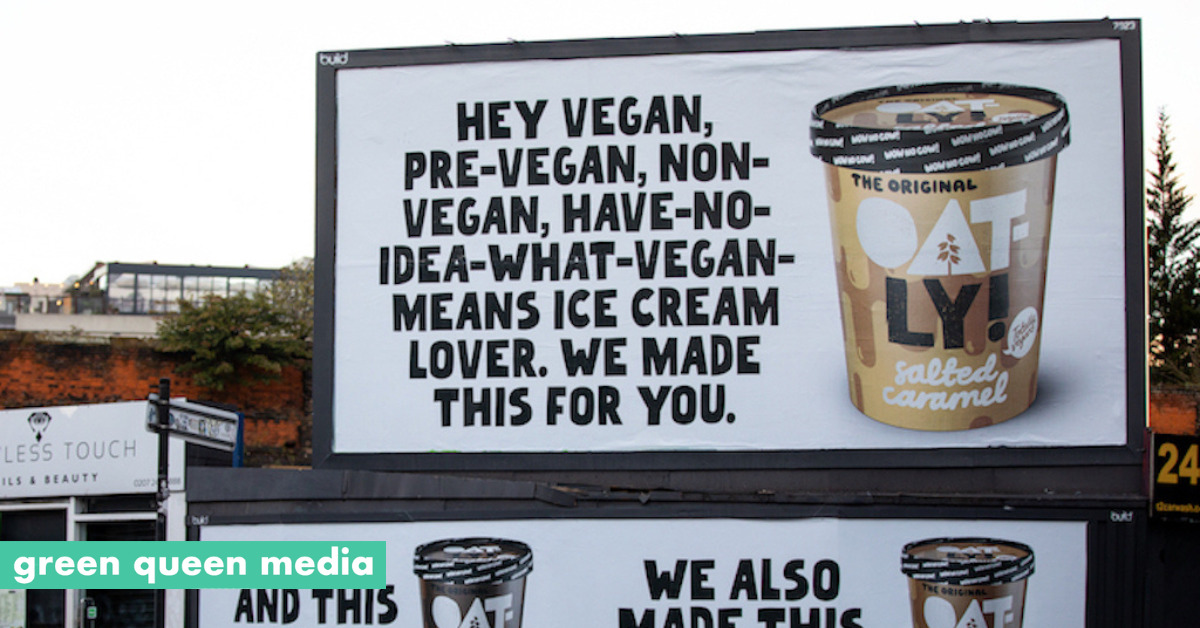
Maybe it’s PETA, maybe it’s Twitter – but for one reason or another, animal rights activists tend to have a reputation for being…well, abrasive. Animal rights activists have been known to throw red paint at people wearing fur coats, and to protest fast food restaurants and anyone eating in them. They’ve used rhetoric that’s perceived to be so extreme as to offend people, like comparing animal cruelty to sexual assault or the Holocaust.
You may even have even found yourself on the ugly side of vegan ire, and if so, you know that it doesn’t always take much to get there. I know this first hand – I’m the founder of Reducetarian Foundation, an organization devoted to encouraging people to eat fewer – but not necessarily zero – animal products. I consider myself to be on the same side as vegans, but some of them vehemently disagree. Once, as I show in my documentary “Meat Me Halfway,” someone went so far as to compare my speaking at an animal rights conference to Donald Trump speaking at a women’s rights conference. While I view cutting back on meat, eggs, and dairy as a step toward veganism, many vegans view it as a step in the wrong direction. And that inspires rage.
But two things can be true at the same time. A person can want to help animals and also eat them. A non-vegan might be just as horrified by the treatment of animals as a vegan, but not change their behavior in the same way. Shaming and unbridled anger probably aren’t the best ways to win them over. Vegans may want to set aside their emotional reactions, at least partially, to think strategically about how best to achieve their goal.
Here’s the thing, though: I don’t blame vegans for being angry. When it comes to animal exploitation, there’s a lot to be mad about. Some truly horrific things happen to animals in our world, and worst of all, they’re common practice. Dairy cows are forcibly and continuously impregnated so they can keep producing milk, baby cows are chained up and eventually slaughtered for veal, male baby chicks are ground up alive because they have no commercial value, chickens and pigs are mutilated without anesthetic, foxes are skinned alive…the list goes on. Frankly, it’s difficult to be aware of the vast amount of animal suffering and not start seeing anyone who’s not vegan as the enemy. It’s not a very nuanced worldview, but it is one I can understand.
It can be chilling to look around at the world we live in and realize that almost everyone, even the people you love, is participating in this cruelty even indirectly. And vegans have it tough. They get made fun of or accused of being pretentious for acting on their compassion for animals. I think something similar happens to champions of any undersung cause. While they’re acutely aware of a serious issue, the people around them are not. Worse, maybe they are and they just don’t care.
Angry vegans often seem to forget what it was like when they ate animal products themselves—what has been dubbed “vegan amnesia.” Sometimes this can come across as having a lack of patience with non-vegans and their life circumstances. After all, many folks are dealing with difficulty, be it economic constraints around the foods and products they buy, a lack of knowledge about a vegan lifestyle and what it entails, or cultural ties and biological constraints that make cutting out animal products and foods painful and complicated.
Of course, the “angry vegan” stereotype is exactly that- a stereotype. Most vegans I’ve encountered are perfectly pleasant people who direct their ire at systems rather than individuals. Most of them don’t go around yelling at or shaming people who eat meat, eggs, and dairy – though if you ask, they will gladly tell you their reasons for not eating those things. And their reasons are entirely reasonable and justifiable. But as with pretty much any socio-political stance, it seems (and on social media, it feels like), the loudest voices are the ones that dominate. Angry vegans tend to be the most visible ones, but it’s important to remember that they are not representative of vegans as a whole.
We live in a complicated world where it’s actually very difficult – probably impossible – to abstain from participating in any system or supply chain that abuses people and other animals in some way. (Vegans do love their cashews.)
Vegans have a noble goal: a world free of animal suffering. But as of 2023, there are fewer than 90 million vegans total, which represents less than 1.1% of the global population so vegans are facing an uphill battle. For a wide variety of reasons, most of humanity is not vegan. If vegans are going to get non-vegans onside, more flexibility and more understanding may be needed. While the ultimate goal for many vegans is to end animal suffering completely, ethical veganism at its core is about reducing animal suffering, and this is where vegans can achieve some major wins.
Most of us are basically good or at the very least, not actively trying to do harm. Most of us make choices because we want to be happy and out of necessity, habit, convenience and finances. Most of us don’t want to see animals harmed. (Though it’s also important to state that there are plenty of folks who are simply not ethically opposed to consuming animals. I’m sympathetic to this view if the animals did not come from a factory farm—which is less than 1% of them.
Most of us are open to solutions and ways to reduce suffering. Pointing fingers at each other – particularly at people who ultimately share your goals – isn’t going to accomplish very much. Instead of letting the perfect be the enemy of the good when it comes to dietary choices, we need to come at this with empathy and be encouraging of flexitarians, vegetarians and really anyone open to reducing animal consumption.
We need to allow people space and encourage degrees of change if we want to grow our movement. It’s going to take a lot of public pressure to enact change at higher levels in society, like government regulations on animal welfare, for example. We need to build solidarity between all those who share our beliefs – not simply our diets. Far from being a betrayal of vegan values, it’s the ultimate compassion towards others in service of an ethical vegan mission, which is to reduce animal suffering where possible.
The post OpEd: I’m The Target Of ‘Angry Vegan’ Ire And Truth Be Told, They Have A Point, But It’s Not The Answer first appeared on Green Queen.
The post OpEd: I’m The Target Of ‘Angry Vegan’ Ire And Truth Be Told, They Have A Point, But It’s Not The Answer appeared first on Green Queen.
This post was originally published on Green Queen.
On Thursday, local diners just might think twice about chowing down on fried chicken after they see—and hear—“Hell on Wheels,” PETA’s new guerilla-marketing campaign featuring a life-size chicken transport truck covered with images of real chickens crammed into crates on their way to a slaughterhouse, complete with actual recorded sounds of the birds’ cries and a subliminal message every 10 seconds suggesting that people go vegan. It will debut by circling The Chicken Shack before driving past Chicken King, Angry Chickz, Spicy Birdz, Al’s Hot Chicken, Chick-fil-A, and other eateries as part of the group’s national tour.
When: Thursday, April 13, 12 noon
Where: Outside The Chicken Shack, 1108 Fulton St., Fresno
“Opting for a tasty vegan option instead of dead-chicken salad or wings means that a bird won’t endure a hideously frightening trip to the slaughterhouse and a violent death,” says PETA President Ingrid Newkirk. “Through ‘Hell on Wheels,’ PETA is asking everyone to spare chickens this cruelty by making kind choices at the dinner table and the drive-thru.”
PETA—whose motto reads, in part, that “animals are not ours to eat”—opposes speciesism, a human-supremacist worldview. For more information, please visit PETA.org, listen to The PETA Podcast, or follow the group onTwitter, Facebook, or Instagram.
The post ‘Hell on Wheels’ Is Coming: Squawking Chicken Truck to Ruffle Feathers Outside Local Fresno Restaurants appeared first on PETA.
This post was originally published on Animal Rights and Campaign News | PETA.
As part of a national day of action targeting Starbucks for charging extra for animal-friendly, emissions-slashing vegan milks, PETA supporters wearing cow masks will gather outside the Empire State Building—home to the chain’s three-story restaurant, bar, and café—on Wednesday to intercept would-be customers with free RISE Brewing Co. oat milk lattes. The push for passersby to avoid the coffee chain comes after nearly 150,000 PETA supporters asked the company to end its vegan upcharge and after Starbucks admitted that nondairy milks are better for the planet.
When: Wednesday, April 12, 12 noon
Where: Outside the Starbucks Reserve at the Empire State Building, 350 Fifth Ave. (at the southwest corner of the intersection with 34th Street), New York
“Starbucks is counting its beans when it should be counting the number of customers it will lose if it doesn’t end the vegan milk upcharge,” says PETA Executive Vice President Tracy Reiman. “People who choose to drink responsibly for the sake of animals or their own health or because they know that dairy farming is fueling the climate catastrophe are angry with the company for placing profits above ethics.”
PETA has also held vegan coffee drink giveaways outside Starbucks locations in Boston, Cincinnati, Philadelphia, and numerous other cities.
PETA—whose motto reads, in part, that “animals are not ours to eat or abuse in any other way”—opposes speciesism, a human-supremacist worldview.
For more information, please visit PETA.org, listen to The PETA Podcast, or follow the group on Twitter, Facebook, or Instagram.
The post Free Coffee! PETA ‘Cows’ to Hijack Starbucks Customers in Surcharge War appeared first on PETA.
This post was originally published on Animal Rights and Campaign News | PETA.
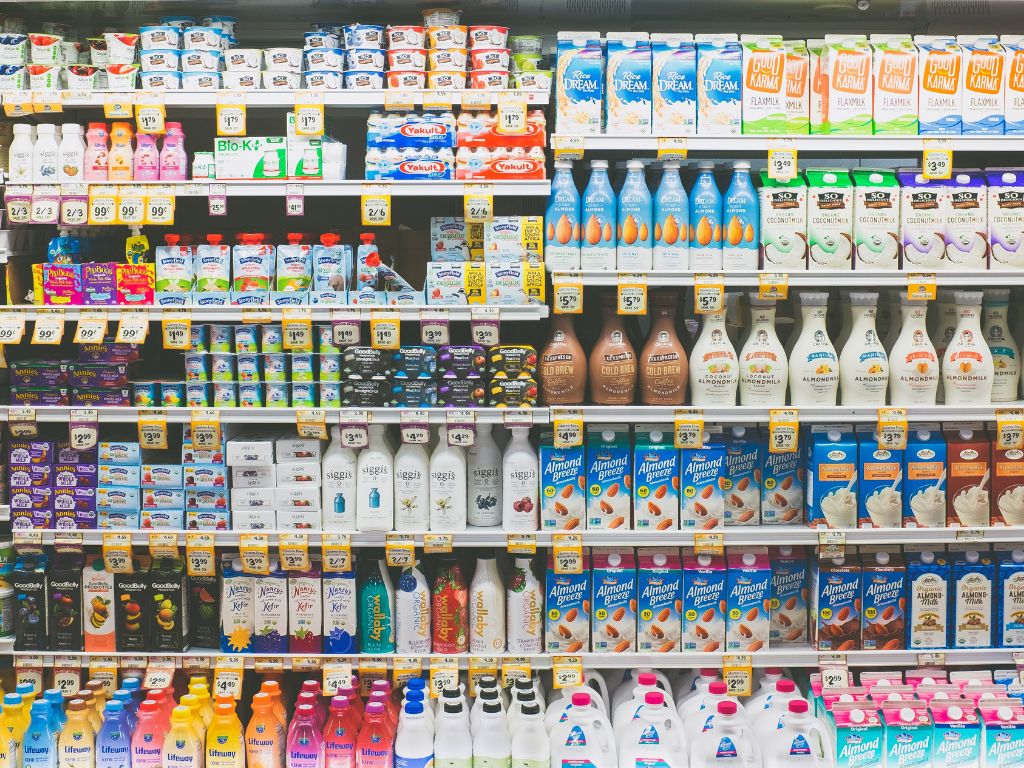
Despite inflation over the last year and lackluster sales for several plant-based category leaders that dipped the sector by 3 percent, 2022 still saw growth, the Plant Based Foods Association (PBFA) says in its latest industry report. Overall, U.S. plant-based food sales grew 6.6 percent, bringing the category to $8 billion for the year.
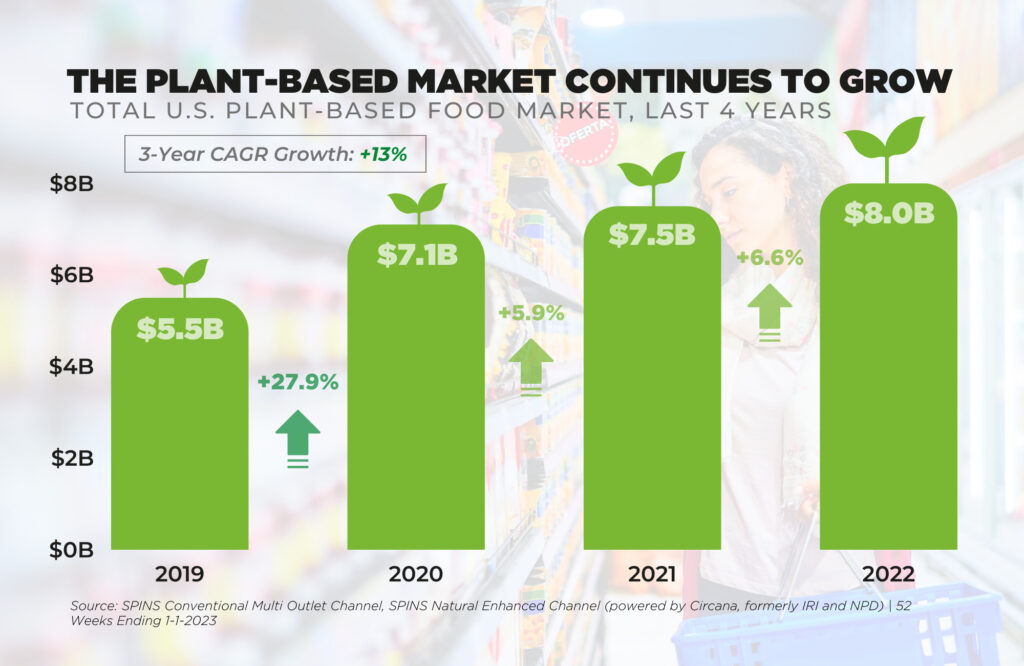
“The plant-based foods industry’s momentum and resilience – built on robust consumer demand – is evident across 2022 retail and e-commerce sales and foodservice performance,” Julie Emmett, PBFA Vice President of Marketplace Development, said in a statement.
“We know consumer interest is strong, now it’s a matter of continuing to increase access and awareness for existing and future innovative plant-based options and furthering the exciting potential of this industry,” Emmett said.
The rise in plant-based sales comes from the increasing adoption by mainstream, flexitarian consumers, the report says. Sixty percent of total U.S. households are now regularly purchasing plant-based alternatives to conventional animal products, with 80 percent repeating those purchases.
This increase in plant-based purchases comes as animal-based food sales have declined, PBFA says, with plant-based seeing particularly noteworthy growth across eggs, protein powder, coffee creamer, RTD beverages, and dips and spreads. The categories driving the bulk of sales continue to be milk, followed by meat, creamer, ready-meals, and ice cream.
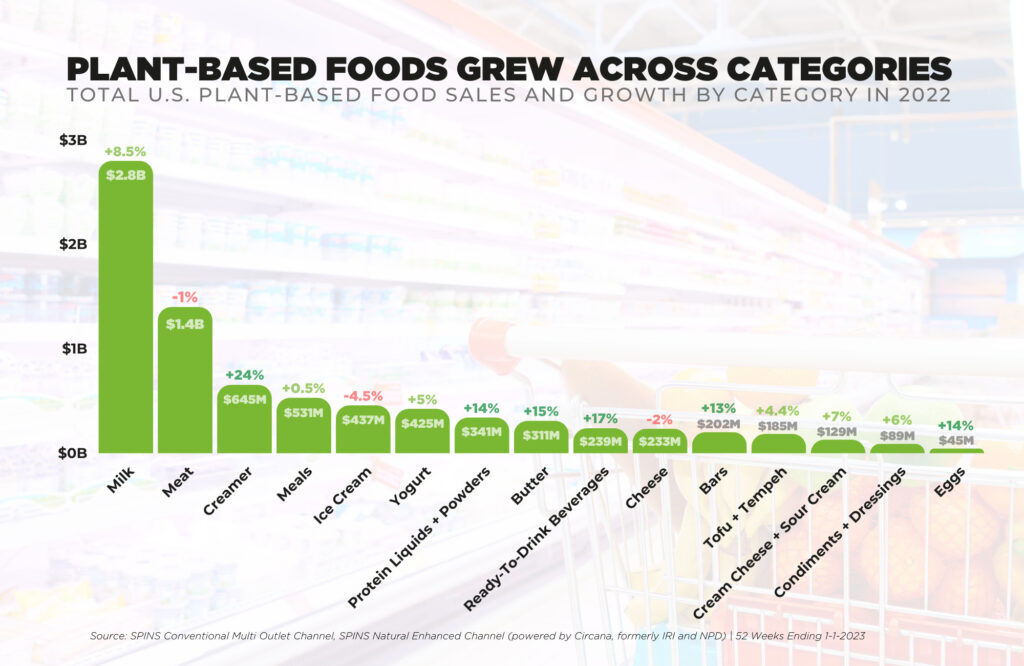
“The variety of standout categories speaks to the expansion of consumer interest in plant-based options for every eating occasion, from post-workout smoothies to morning coffee to indulgent meals,” PBFA notes.
As the sector leader, plant-based milk is now in more than 40 percent of U.S. homes, the report finds, accounting for 15 percent of all fluid milk sales, with 75 percent of those consumers repeat buyers. The vegan milk category grew nine percent to $2.8 billion in 2022.
“Against a backdrop of heavy inflation, plant-based milk units declined by two percent,” the report notes. “As consumers stretched their dollar across total food sales, the price gap between plant-based milk and animal-based milk impacted overall purchasing. In comparison, animal-based milk was also down two percent in units, but saw a 12 percent increase in dollar sales, illustrating the outsized role of inflated
pricing in growing sales figures for animal-based milk.”
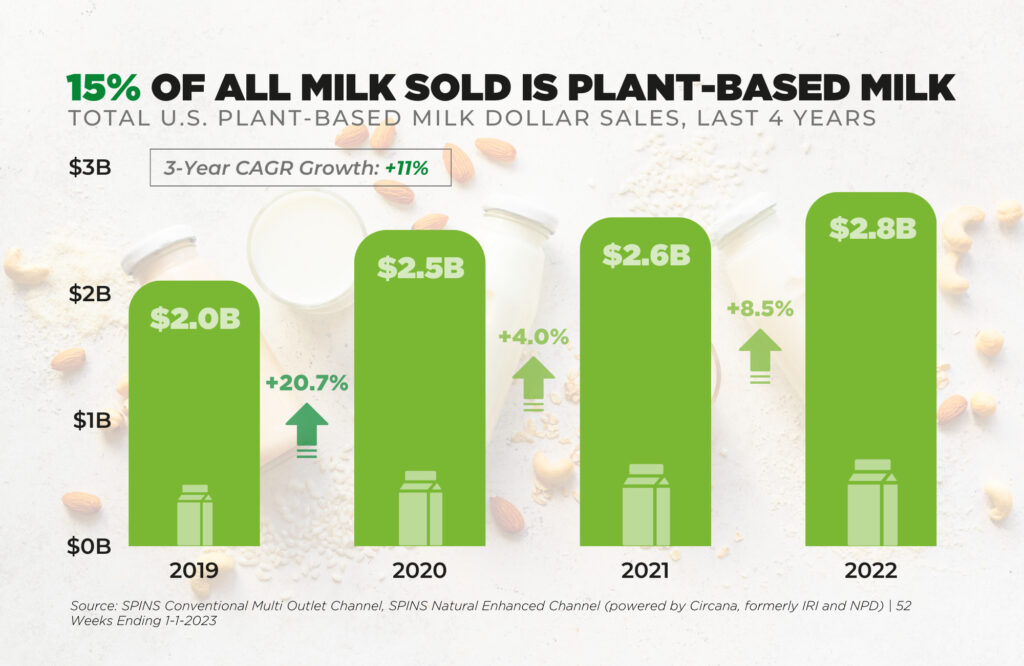
While vegan meat sales remained steady over 2021 numbers, the report notes the category is diversifying, with vegan chicken driving the bulk of sales. The frozen vegan meat category grew by five percent and shelf-stable options grew by more than 80 percent while refrigerated saw a 13.5 percent decline. “Many plant-based meat segments — such as filets; steaks; cutlets and jerky snacks; and nuggets, tenders, and wings — are growing in both dollars and units, while plant-based chunks and strips, deli slices, and meatballs are growing in dollar sales, demonstrating consumer adoption of many different varieties of plant-based meat,” reads the report.
It’s not just consumers stocking vegan options in their refrigerators that drove the growth; the report shows 48 percent of U.S. restaurants now offer plant-based or vegan menu options, “a percentage that has grown steadily, without decline, over the past decade.”
Online sales also increased for plant-based foods, accounting for 6.4 percent of total online sales, compared to 4.5 percent in grocery retail.
“In recent years, we’ve noticed more and more people embracing a conscious way of living,” says Heather Brand, Thrive Market’s senior category manager. “Consumers are more mindful of their impact on the environment, their health, and animal welfare. This has led to a surge in popularity of plant-based foods and products, as people look for healthier and more sustainable options.”
In just the five years since the PBFA began reporting on the sector, it says the sector has gone from six categories to 20, and growth is expected to continue.
“The plant-based foods industry has proven its resilience, weathering unprecedented challenges to maintain cross-category market shares and achieve $8 billion in U.S. retail sales,” says Rachel Dreskin, PBFA CEO.
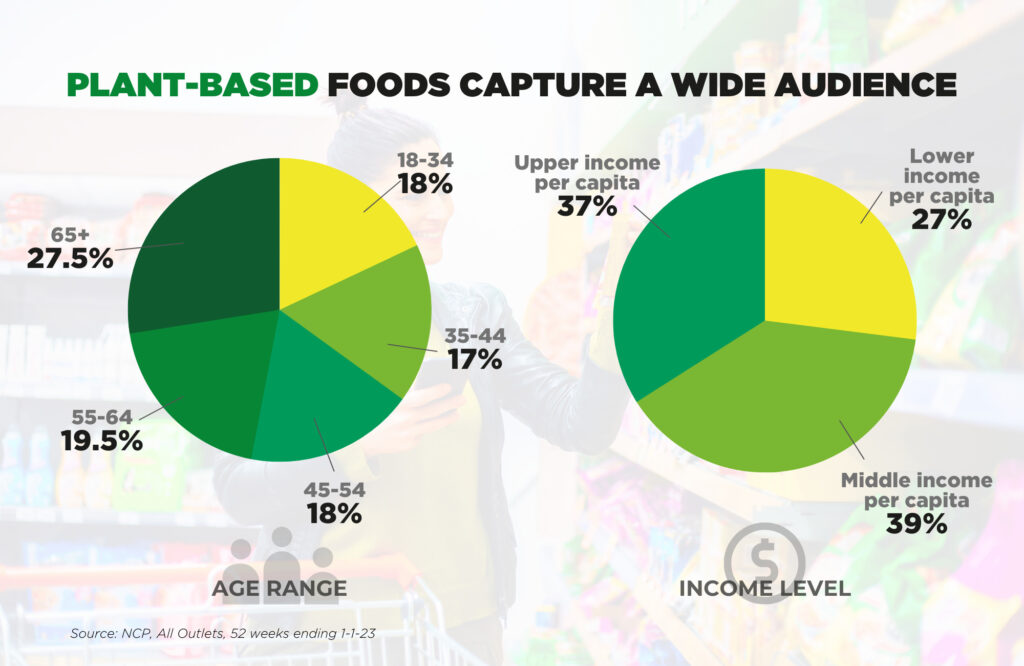
“This success is a testament to the dedication of consumers who are looking for plant-based options for every eating occasion, and the innovative brands and marketplace partners who are working to meet growing demand for sustainable, healthy, and delicious options,” Dreskin said.
PBFA, which worked with the think tank nonprofit The Good Food Institute to analyze the sales data, also found that while inflation affected every segment of the food industry in 2022, the average retail price of animal-based foods increased more than plant-based options. The animal sector increased by an average of 15 percent, while plant-based foods saw only a ten percent spike.
Despite the economic and environmental benefits of increasing plant-based food, consumers are still largely motivated by health, the report found. The environment is the second motivating factor followed by animal welfare.
Seventy-three percent of consumers consider themselves health-conscious, says PBFA, but they’re still motivated by taste and affordability. Younger consumers, particularly Gen Z, are aiming to reduce their carbon footprint, with 79 percent going meat-free one day per week and 65 percent wanting a more plant-forward diet.
“While there is still much to be done by food system stakeholders to sustain and accelerate the momentum of the plant-based foods industry,” PBFA says, “the findings of this report affirm our confidence as an organization and an industry that we, collectively, are on the right path.”
The post $8 Billion U.S. Plant-Based Food Sector Shows ‘Momentum and Resilience’, PBFA Report Finds first appeared on Green Queen.
The post $8 Billion U.S. Plant-Based Food Sector Shows ‘Momentum and Resilience’, PBFA Report Finds appeared first on Green Queen.
This post was originally published on Green Queen.
This little goat went to slaughter, traumatizing the girl who had cared for him. The viral story of Cedar the goat, whose killing sparked a nationwide uproar, is showing people that 4-H and other youth agricultural programs promote speciesism and desensitize young people to violence. Most animals used as “projects” in these archaic programs end up on a trip to the slaughterhouse. The “lucky” ones spend the rest of their lives as breeding machines.
Young people who are interested in our fellow animals may gravitate toward programs like the National FFA Organization or 4-H. But these programs view animals as commodities, not as individuals with needs and desires of their own. Young people quickly learn that the cow, pig, sheep, or goat they take on will be either a “market” animal or a “breeding” animal. Cows fated to become meat are judged according to their “yield of the carcass.” Those destined to spend their lives producing milk are judged on their potential for “heavy production and a long period of usefulness.” The rabbit with a “well fleshed rump” will end up on a dinner plate.
4-H participants spend countless hours tending to their charges as best they can, learning everything about their personalities, quirks, likes, and dislikes. But at the end of the season, they must watch the animals they’ve bonded with and nurtured be sold off to the highest bidder.
Kids and teens are given the dangerous message that sending their animal friends off to endure a violent, terrifying death at the slaughterhouse is normal and routine. The disconnect is chilling. As one former 4-H member blithely put it, “I can honestly say I looked at it as … an opportunity to make some money. … The rewards are greater than the heartache.”
Sheriff’s deputies drove more than 500 miles to kill a 9-year-old’s goat, even though her mother offered to pay for all expenses.
Cedar didn’t deserve to be killed—and the Anderson Country Review should be embarrassed for responding so heartlessly. pic.twitter.com/jTkJUskJMN
— PETA (@peta) April 8, 2023
Learning kindness is crucial to the health and well-being of future generations.
Our natural affinity and respect for other animals should never be snuffed out to make room for a cold, uncaring attitude that would allow young people to abandon intelligent, social animals to be slaughtered.
As psychologist Dr. Aubrey H. Fine puts it, “Early life experiences seeing animals being treated fairly seems to have a positive impact [on] children and helps them in developing their moral character.”
It’s unfair both to animals and to young people when their trust is betrayed. Animals go from a familiar environment one day to a frightening and confusing experience the next, which only ends when a worker slits their throat. And young people who were tending to their animals’ needs and snuggling with them in the hay between showings watch as their beloved friends are taken away, never to be seen again.
But not all 4-H participants are cavalier about this grim outcome. When one 8-year-old sold her first “market” calf, she lamented, “His name was Justin, and he was my best friend. We went to the fair and I got a blue ribbon. When the reality of the fact that he had to go to market hit, it was awful.”
How to respect animals for who they are, instead of how humans can profit from them, is a lesson worth learning.
Did you know that you could save nearly 200 animals per year just by going vegan? That’s right—being vegan saves lives.
Getting started is easy! PETA’s vegan starter kit has everything from recipes and tips on eating out to health information:
The post Viral Story of Slaughtered Goat Reveals How 4-H Seeks to Desensitize Kids to Violence appeared first on PETA.